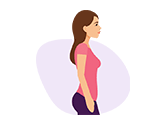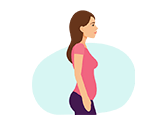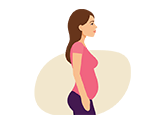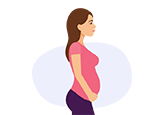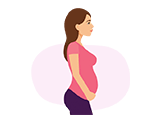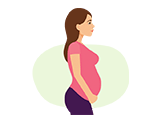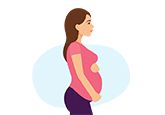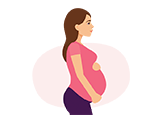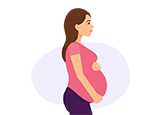Pregnancy Diet Plan - Month by Month
Diet Plan Chart
First Month of Pregnancy: Foods To Eat & Avoid

Congratulations on the exciting news of your pregnancy! As you embark on this incredible journey, your body will undergo many changes, including cravings and aversions to certain foods. During the first month of pregnancy, it’s essential to maintain a healthy and balanced diet to support the growth and development of your baby. While there are foods you should avoid, there are plenty of delicious and nutritious options you can indulge in. In this article, we’ll explore the best choices regarding what to eat in first month of pregnancy, helping you make informed choices for you and your little one.
Video: First Month Pregnancy Diet – Foods to Eat and Avoid
Foods You Should Eat During the First Month of Pregnancy
The symptoms of pregnant become noticeable only after about 2 ½ weeks of pregnancy. So, accounting for that, you need to follow a specific diet plan.
1. Dairy Products
Dairy products, especially the fortified ones are a great source of calcium, vitamin D, protein, healthy fats, and folic acid. Add yoghurt, and milk to your diet to gain the benefits of these nutrients.
2. Folate-Rich Foods
During the early development of the foetus, folic acid helps form the neural tube. Folic acid is very important because it can help prevent some major birth defects of the baby’s brain (anencephaly) and spine (spina bifida). It’s important to add folate-rich foods to your diet even if you are taking folic acid supplements. Examples of such foods are citrus fruits, beans, peas, lentils, rice, and fortified cereal.
3. Whole Grains
Whole grains are a healthy source of carbohydrates, dietary fibre, vitamin B-complex, and minerals like iron, magnesium and selenium. These are essential for your baby’s growth and development. Examples of whole grains include barley, brown rice, buckwheat, bulgur wheat, millets, and oatmeal.
4. Eggs and Poultry
Eggs are a good source of proteins, vitamins A, B2, B5, B6, B12, D, E, and K, and minerals like phosphorus, selenium, calcium and zinc. Poultry is also an excellent source of proteins.
5. Fruits
Fruits such as musk melon, avocado, pomegranate, banana, guava, oranges, sweet lime, strawberries, and apples contain several vitamins and antioxidants necessary for the growth of the baby in the womb.
6. Vegetables
Plenty of vegetables on your plate will ensure your baby gets all the nutrients. Some vegetables you should include are broccoli, kale, spinach, carrots, pumpkin, sweet potatoes, tomatoes, bellpeppers, corn, drumstick, eggplant, cabbage, etc.
7. Seeds and Nuts
Seeds and nuts are excellent healthy fats, vitamins, proteins, minerals, flavonoids, and dietary fibre sources. Ensure you eat these regularly in the first month and throughout your pregnancy.
8. Fish
Fish has low-fat and high-quality protein. It’s also a good source of Omega-3 fatty acids, Vitamins B2, D, and E, and essential minerals like potassium, calcium, zinc, iodine, magnesium, and phosphorous. However, raw fish or shellfish should be avoided.
9. Meats
Meat contains vitamin B, proteins, zinc, and iron which are good for you and the baby. Include lean meats in your diet in the first month of pregnancy.
10. Cod Liver Oil
Cod liver oil is rich in Omega-3 fatty acids essential for fetal brain and eye development. Vitamin D can prevent preeclampsia – all the more reason to have it!
11. Dried Fruits
One serving of dried fruits provides pregnant women with vitamins, minerals, iron, potassium and folate. Prunes and dates are good choices. However, these are also rich in natural sugars, so avoid taking more than one helping at a time.
12. Iodised Salt
Only use iodised table salt during pregnancy. Salt infused with iodine can help the baby’s nervous system and brain develop properly.
Foods to Avoid in the First Month of Pregnancy
There are some foods which should be avoided during early pregnancy. Here are some of them:
1. Soft Cheese
Soft cheese is made from unpasteurised milk and contains bacteria that can cause food poisoning. Hence, it’s best to avoid soft cheese during early pregnancy.
2. Packaged and Processed Foods
Packaged and processed foods such as juices, microwave-ready meals, cakes, biscuits, condensed milk, etc. contain preservatives and empty calories. Some packaged foods may also contain bacteria that can cause food poisoning. Eat fresh, home-cooked meals made with natural or organic produce instead.
3. Seafood
Seafood contains high levels of mercury, that can lead to foetal brain damage and a delay in developmental milestones. Avoid swordfish, and raw shellfish, and limit the consumption of tuna, salmon, mackerel, sardines, trout and herring.
4. Papayas
Unripe and semi-ripe papayas contain latex, which triggers uterine contractions and causes preterm labour or even miscarriage. Avoid these during pregnancy. Ripe papayas contain several nutrients and can be consumed in moderation if your doctor gives you the go-ahead.
5. Pineapples
Pineapples contain bromelain that can soften the cervix and lead to miscarriages or preterm labour. So, it’s better to avoid pineapples during early pregnancy.
6. Raw/Undercooked Eggs and Meats
Raw or undercooked meats may be contaminated by bacteria, salmonella, listeria, etc., that can affect the unborn child’s development. Even slightly undercooked pork contains roundworm cysts that can cause severe damage to the baby’s health.
7. Caffeine
Caffeine should be limited in early pregnancy as excess causes sleeplessness, irritability and nervousness. It also increases the risk of miscarriage.
8. Alcoholic Beverages
Alcohol is bad for the developing foetus as it can cause severe birth defects.
9. Sugary Foods
Pregnant women need an extra 300 calories daily to support the baby’s growth. However, consuming too many sweets leads to weight gain and gestational diabetes.
Video : First Month of Pregnancy Diet : Foods that You Should Avoid
Folate-Rich Food Menu for a Day in your First Trimester
The following sample menu includes a variety of folate-rich foods, such as avocado, spinach, sweet potato, and quinoa. It also includes lean proteins like chicken and salmon, essential for foetal development. Additionally, the snacks provide a healthy dose of fibre and vitamins. Remember to speak to your healthcare provider before making any major dietary changes during pregnancy. You can follow this chart or a similar one to curate in your 1st month pregnancy diet.
1. Breakfast
2 slices of whole wheat toast with 1/2 avocado spread and 1 poached egg on top
1 cup of sliced strawberries
1 cup of orange juice
2. Lunch
Grilled chicken breast salad with spinach, cherry tomatoes, 1/2 cup of sliced cucumbers, and 1/2 cup of sliced red peppers
1 small baked sweet potato
1 medium-sized apple
3. Snack
1/2 cup of edamame
1 medium-sized banana
4. Dinner
4 oz of grilled salmon with a side of steamed broccoli and 1/2 cup of cooked quinoa
1 small baked sweet potato
1 small green salad with mixed greens and sliced cucumbers, topped with a vinaigrette dressing
Tips
Here are some things you should keep in mind:
Take prenatal vitamins, including folic acid.
Consume a calcium-rich diet during pregnancy
Talk to your doctor before embarking on a strict diet regime.
Moderation is key – even healthy foods should be consumed in moderation. Excess of anything is bad.
Include fruits and vegetables on your plate and cut down on junk food.
Drink water.
FAQs
1. Which Dry Fruits Are Best in Pregnancy?
Dry fruits are an excellent source of essential nutrients during pregnancy. The best dry fruits to include in your diet during pregnancy are almonds, walnuts, cashews, dates, and figs. These dry fruits are rich in iron, calcium, magnesium, and fibre, which are essential for the baby’s development.
2. Is Rice Good During Pregnancy?
Yes, rice is an excellent carbohydrate source, a crucial nutrient during pregnancy. It provides the necessary energy for the mother and the baby. Brown rice is an even better option as it is rich in fibre and nutrients, such as vitamin B, zinc, and iron.
3. Is It Safe to Eat Noodles During Pregnancy?
Noodles are not harmful during pregnancy if consumed in moderation. However, it is essential to choose noodles made from whole grains and avoid those that contain artificial flavourings, preservatives, and MSG. Instant noodles, in particular, should be consumed in moderation as they are high in sodium and unhealthy additives.
4. Which Vegetables Should I Avoid in Pregnancy?
While vegetables are generally healthy during pregnancy, there are a few that you should avoid or limit. These include raw or undercooked sprouts, such as alfalfa, clover, and radish, as they can carry bacteria that cause foodborne illnesses. You should also limit your intake of cruciferous vegetables, such as broccoli and cauliflower, as they can cause bloating and gas. Additionally, some women may need to avoid nightshade vegetables, such as tomatoes and eggplants, if they experience heartburn or acid reflux. Consult with your healthcare provider for specific dietary recommendations as they can make a personalised food diet for you based on your pregnancy progress.
Several changes occur in your body in the first month of pregnancy. Hormonal changes can cause mood swings, fatigue and morning sickness. Eat healthy food, have small meals at regular intervals, keep yourself hydrated, do light exercises, and be stress-free to minimise these symptoms and keep your baby healthy and happy.
References/Resources:
1. Have a healthy diet in pregnancy; NHS; https://www.nhs.uk/pregnancy/keeping-well/have-a-healthy-diet/
2. Pregnancy nutrition: Foods to avoid during pregnancy; Mayo Clinic; https://www.mayoclinic.org/healthy-lifestyle/pregnancy-week-by-week/in-depth/pregnancy-nutrition/art-20043844
3. Pregnancy: Nutrition; Cleveland; https://my.clevelandclinic.org/health/articles/12593-pregnancy-nutrition
4. Foods to Avoid When Pregnant; American Pregnancy Association; https://americanpregnancy.org/healthy-pregnancy/pregnancy-health-wellness/foods-to-avoid-during-pregnancy/
5. 5 Snack Foods to Eat While Pregnant; Health; https://www.hopkinsmedicine.org/health/wellness-and-prevention/5-snack-foods-to-eat-while-pregnant
6. 4. PRENATAL NUTRITION; UMICH; https://www.med.umich.edu; April 2017
Also Read:
Pregnancy Diet for 3rd Month
2nd Month Pregnancy Diet – What to Eat and Avoid?
4th Month Pregnancy Diet – Foods to Eat and Avoid
Diet for 2nd Month of Pregnancy (5-8 Weeks)

Congratulations! You are in the second month of your pregnancy. Although most women don’t know they are pregnant by this time, those who do are very careful about their diet (just as they should be). During the second month of pregnancy, diet is vital for the well-being of both the mother and the developing baby. Nutrition is of primary importance at this stage as it helps properly develop the foetus. The foetus’s neural tube develops during this time, which then later develops into the brain, spinal cord, and nerves.
A diet rich in vitamins, minerals, proteins and other nutrients is mandatory during this time and throughout the pregnancy. A well-planned 2nd month pregnancy food regimen ensures adequate nutrition, supporting the baby’s development and the mother’s well-being. Read on to find out what foods and nutrients should be a part of your second-month pregnancy diet.
Importance of Right Diet in Second Month of Pregnancy
The second month of pregnancy marks a crucial time for the mother and the developing baby when the baby grows quickly. Consuming a balanced and nutritious diet during 2nd month of pregnancy is essential for providing the necessary nutrients for fetal growth and development. Nutrient-rich foods such as fruits, vegetables, lean proteins, whole grains, and dairy products should be prioritised to ensure the mother’s health and support the baby’s early development (9). Additionally, staying hydrated by drinking plenty of water is essential for supporting the body’s changing needs for both mother and baby. Creating a 2nd-month pregnancy diet chart helps mothers plan nutritious meals for better health during this crucial stage.
Essential Nutrients That Should be a Part of Your Diet in the Second Month of Pregnancy
The foods you eat in the first trimester of your pregnancy will support the healthy development of your baby. Morning sickness and nausea may make you feel uneasy, and you may not want to eat, but you should try to eat healthy food. Try and incorporate the foods that offer you as many nutrients as possible. Choosing the right food for the second month of pregnancy is vital to provide essential nutrients for the baby’s growth and the mother’s health. Mentioned below are some nutrients that are vital for the baby’s development.
Folic Acid: An integral part of the 7-week pregnancy diet, folic acid serves the purpose of Vitamin B. A daily folic acid supplement of 5 mg is recommended for a woman who is trying to conceive as well as for a pregnant woman in her first trimester. Folic acid helps protect the unborn baby from developing neural tube defects (1). Green leafy vegetables, eggs, fruits, dry fruits, nuts (almonds and walnuts), pulses, and lentils are all rich natural folic acid supplements for a pregnant woman.
Iron: Another essential nutrient that should be a part of the 5th-week pregnancy diet is iron – it is mandatory for a healthy blood supply (11). At this stage, a pregnant woman needs a strong blood flow in her body as it gives her the strength to deal with morning sickness and fatigue, commonly experienced in the first trimester of pregnancy. In the first week of your second month, eat foods rich in iron, such as fruits and dry fruits, and vegetables, such as spinach, fenugreek, beetroot, chicken and fish.
Calcium: Calcium is an essential mineral for a pregnant woman, especially in the second month of her pregnancy. About 1000 mg intake of calcium is imperative during pregnancy (6). The body needs calcium as the foetus’s bones ossify at this stage. If the body is not supplied with the required amount of calcium, it will be extracted from existing reserves, thus increasing the chances of osteoporosis. To meet your calcium requirements, you can eat vegetables like turnips, cabbage and leafy vegetables, as they are all excellent sources of calcium.
Proteins: Protein is essential from the onset of pregnancy. Poultry foods like chicken, eggs, milk, fish, and lentils provide the necessary protein required by the body. An expectant mother needs a minimum of 75 g of protein at this stage. You can eat the protein-rich foods mentioned above. However, be careful about the fish you choose, as certain types of fish (especially those with high mercury content) are not safe for consumption by a pregnant woman and should be avoided during pregnancy.
Zinc: Zinc is needed for the metabolism of acid and biological functions. Chicken, fish, vegetables, and beans are all rich sources of zinc. Make sure you include these foods in your diet daily.
Fats: Fats are not always bad, but the kind of fat you consume will determine your baby’s healthy growth. There is no doubt that fried foods and foods containing saturated fat are detrimental to your and your baby’s health. However, a healthy intake of good fat in ghee and cream will aid in developing the eyes, brain, placenta, and tissues. Including good fats in your diet in healthy proportions will thus help your baby’s overall growth.
Fibre: An essential nutrient that aids digestion and prevents constipation, fibre is highly recommended for pregnant women (4). A fibre-rich diet of vegetables like carrots and cabbage, cereals, and fruits like oranges and bananas will help maintain your blood pressure and prevent constipation during pregnancy. A minimum intake of 28 grams daily is recommended during pregnancy.
Foods to Avoid in the Second Month of Pregnancy
The foods that should be avoided in the second month of pregnancy are mentioned below –
Meat Spreads: Meat spreads contain listeria, which is harmful during this stage of pregnancy. It affects the baby’s growth and must be avoided entirely (10).
Soft Cheese: Consumption of soft cheese like brie and camembert is not recommended as they may contain E. Coli bacteria, which may lead to complications in pregnancy. So you must avoid eating soft cheese during pregnancy; you can opt for hard cheese, but do eat it in a limit.
Raw Eggs: Raw eggs could spread the salmonella bacteria (7) through the body, causing a detrimental effect on the mother’s body and hampering the baby’s normal development. If you want to eat eggs during pregnancy, make sure you eat them in the boiled or poached form. Avoid eating half-boiled or semi-cooked eggs.
Processed Meat: Processed meat is stored on shelves for a long time and risks carrying harmful bacteria to the baby and you. So avoid including processed meat in your pregnancy diet.
Raw Fish: Sea-foods like crabs, prawns, shrimp, etc., are high in mercury and are known to cause a miscarriage (5). These foods are not rich in protein and do not provide the body with any necessary nutrition.
Unpasteurised Milk: Do not drink unpasteurised milk (3). Unpasteurised milk contains microorganisms, pathogens, and salmonella that harm your body and the baby’s growth.
Alcohol: Alcohol is strictly not permitted as it could lead to several complications. It may affect your health and, most important, the growth of the baby (2). So avoid drinking alcohol throughout your pregnancy.
Consume fresh fruits and vegetables, thoroughly cooked, and protein-rich foods to build muscles and feel energetic. Consume more starchy food than sugary foods to up your calorie intake.
Dietary Tips to Follow in the Second Month of Pregnancy
Here are some dietary tips you should follow during the second month of your pregnancy.
You will get the maximum benefits from the food you eat if you eat it at the right time and in the proper proportions. Try to have a healthy breakfast comprising fruits, vegetables, cereals, and dairy products like milk. Eating a slightly rich diet in the morning will help as it will give you more time to digest the food.
Your diet in the afternoon should comprise salads, eggs, etc. Having salad during lunch will help you stay fresh and energetic. You could also include boiled eggs in your lunch. A meal comprising chapatis, cooked sabji, rice and dal will be nourishing at this stage.
You will likely experience morning sickness in the first trimester of your pregnancy, so keep your dinners light. Eating light food will keep your stomach full and happy and prevent heartburn. If you want a nourishing yet light meal, eat boiled and cooked vegetables with less spice and salads for dinner.
If you feel peckish, eat small portions of healthy snacks like upma. Avoid fried food and be guided by your appetite. Do not binge eat, as many would insist that you need to eat for two. You don’t need to eat for two – you need to eat as per your appetite (8). So eat as per your body’s requirements and ensure it is healthy enough for you and your baby!
FAQs
1. Should I be taking any supplements during the second month of pregnancy?
Taking a prenatal vitamin containing folic acid, iron, calcium, and other essential nutrients is recommended. However, consult your doctor before starting any supplements to ensure they’re appropriate for your and your baby’s needs.
2. How much weight should I expect to gain during the second month of pregnancy, and how does it affect my diet?
Weight gain during the second month of pregnancy varies but typically ranges from 1 to 4 pounds. Focus on eating nutrient-dense foods to support your baby’s growth and development while managing weight gain. Your doctor can offer personalised guidance based on your pre-pregnancy weight and overall health.
3. How can I ensure I’m getting enough nutrients if I’m experiencing food aversions or cravings during the second month of pregnancy?
If you’re experiencing food aversions or cravings, try to find alternative foods that provide similar nutrients (12). For example, if you’re averse to meat, consider incorporating plant-based protein sources like beans or tofu. Listening to your body’s cues is essential while still striving to maintain a balanced diet.
Remember, your nutrition depends on your chosen foods, so choose wisely. Ensure you limit your sugary and fried foods and foods high in calories, as they provide no nutrition to your baby. Eat healthy and stay healthy during pregnancy; your baby will be just fine!
References/Resources:
1. Pregnancy and diet; Better Health Channel; https://www.betterhealth.vic.gov.au/health/healthyliving/pregnancy-and-diet#folic-acid-folate-and-pregnancy
2. Eat Healthy During Pregnancy: Quick Tips; Office of Disease Prevention and Health Promotion; https://health.gov/myhealthfinder/pregnancy/nutrition-and-physical-activity/eat-healthy-during-pregnancy-quick-tips
3. Food Safety During Pregnancy; Nemours Children’s Health; https://kidshealth.org/en/parents/foods-pregnancy.html
4. Pregnant or Breastfeeding? Nutrients You Need; Nemours Children’s Health; https://kidshealth.org/en/parents/moms-nutrients.html
5. Eating During Pregnancy; Nemours Children’s Health; https://kidshealth.org/en/parents/eating-pregnancy.html
6. What to eat when pregnant; UNICEF Parenting; https://www.unicef.org/parenting/what-to-eat-when-pregnant
7. Foods to avoid in pregnancy; Tommy’s; https://tommys.prod.acquia-sites.com/pregnancy-information/im-pregnant/nutrition-in-pregnancy/foods-avoid-pregnancy
8. How much should I eat during pregnancy?; Tommy’s; https://www.tommys.org/pregnancy-information/im-pregnant/nutrition-in-pregnancy/how-much-extra-should-i-eat-pregnancy
9. How to eat well in pregnancy; Tommy’s; https://www.tommys.org/pregnancy-information/im-pregnant/nutrition-in-pregnancy/balanced-diet-pregnancy
10. Nutrition During Pregnancy; Johns Hopkins Medicine; https://www.hopkinsmedicine.org/health/wellness-and-prevention/nutrition-during-pregnancy
11. Pregnancy Nutrition; American Pregnancy Association; https://americanpregnancy.org/healthy-pregnancy/pregnancy-health-wellness/pregnancy-nutrition/
12. 5 Snack Foods to Eat While Pregnant; Johns Hopkins Medicine; https://www.hopkinsmedicine.org/health/wellness-and-prevention/5-snack-foods-to-eat-while-pregnant
Also Read:
First Trimester Diet
Fourth Month Pregnancy Diet
Pregnancy Diet for 3rd Month
Third Month of Pregnancy Diet (9-12 Weeks)

Being pregnant is a beautiful time, but with it come certain responsibilities and lifestyle changes that are crucial for the growth and development of the baby, as well as the health and safety of the mother. The third month of pregnancy (9-12 weeks) can be a difficult time for the mother-to-be, as the morning sickness, fatigue, and mood swings increase tremendously. This is also the time when the most number of miscarriages have been reported.
It is, therefore, essential for the mom-to-be to remain stress-free. She should also eat nutritious food to ensure the healthy growth and development of the baby. An expecting mother’s diet during the third month of pregnancy is crucial in determining the foetus’s health. This article focuses on 3rd month of pregnancy foods that are essential for this period.
Essential Nutrients for the Third Month of Pregnancy
During your third month of pregnancy, your dietary intake must increase by 300 calories over your regular intake. To do so, you must include the following in your diet during 3rd month of pregnancy:
Fresh Fruits: 2-4 servings
Dairy Products (Cheese, Milk, Yoghurt): 4 servings
Vegetables: 4 servings
Grain-based Food (Rice, Wheat, Oats, Quinoa, Bulgur, Barley, etc.): 6-11 servings
Poultry and Meat: 2 servings
Nuts: 1 serving
3rd Month of Pregnancy Diet – What Foods to Eat
Your pregnancy diet in the first trimester should provide all the nutrition the foetus needs to grow into a healthy baby. Are you wondering what to eat during the 3rd month of pregnancy to have a healthy baby? Here is a list of foods you should include in your 3rd-month pregnancy diet chart:
1. Vitamin B6-Rich Foods
In the third month, morning sickness may peak at week nine and may start decreasing by the end of week 12. Vitamin B6 helps combat nausea and vomiting (1). Vitamin B6-rich foods include lean meats, poultry, eggs, citrus fruits, legumes, soybeans, nuts, seeds, and avocados.
2. Folate-Rich Foods
Folate or folic acid is essential for adequately developing the baby’s brain and spinal cord (2). Even if you take folic acid supplements, including natural sources of folate-rich foods in your diet is good. Folate-rich foods include broccoli, citrus fruits, beans, peas, lentils, avocado, Brussels sprouts, okra, asparagus, and dark green leafy vegetables like spinach and kale.
3. Omega-3-Rich Foods
Omega-3 fatty acids are essential nutrients necessary for the baby’s healthy development of the eyes and brain (3). Foods rich in Omega-3 fatty acids are soybeans, canola oil, walnuts, chia seeds, flaxseeds, salmon, mackerel, sardines, and wild rice.
4. Fresh Fruits
Fruits contain many nutrients and antioxidants for the baby’s healthy growth and development. Fresh fruits are a better source of nutrients than fruit juices and canned or frozen fruit. Include plenty of muskmelons, avocados, pomegranates, bananas, guava, oranges, sweet limes, strawberries, and apples (4).
5. Vegetables
Healthy food for a 3-month pregnant lady should include at least 3 cups of vegetables per day. Choose different coloured vegetables and mix them to ensure you get a wide range of nutrients and tastes. Examples include kale, spinach, broccoli, sweet potatoes, tomatoes, carrots, pumpkin, bell peppers, corn, eggplant, cabbage, drumstick, etc (5).
6. Carbohydrates
Carbohydrates are an essential energy source for our bodies. Complex carbohydrates are found in foods like whole grains and legumes, pasta, bread, rice, and starchy vegetables like potatoes and sweet potatoes, which are suitable for the body and provide steady energy. Simple carbohydrates from natural sources like fruits and vegetables that contain fibre are also good for your growing baby. Avoid simple carbs like refined flour and processed foods such as cookies and cakes. These empty calories are bad for the baby (6).
7. Proteins
Proteins are the building blocks of DNA, tissue, and muscles. They also play an important role in triggering enzymes in our bodies. Proteins are, therefore, essential for the proper development of the foetus. Protein-rich foods include legumes, quinoa, seeds, lentils, chicken, nuts, nut butter, meat, and soybeans (7).
8. Dairy
Dairy products are an excellent source of calcium, which is very important for developing strong and healthy bones. Examples include milk, yoghurt, and hard cheeses. If you are allergic to dairy, other sources of calcium-rich foods are kale, watercress, and sardines (8).
9. Vitamin D
Vitamin D is essential in developing the immune system, healthy teeth and bone development, and healthy cell division in the baby. Vitamin D-rich foods include fatty fish like salmon, mackerel, tuna, egg yolk, cod liver oil, and vitamin D-fortified milk or cereals (9).
10. Zinc
Zinc is an essential mineral that is important for the development of a healthy immune system and nervous system (10). Zinc-rich foods include beef, spinach, wheat germ, mushrooms, oysters, lamb, pumpkin and squash seeds, chicken, nuts, and beans.
Foods to Avoid During the Third Month of Pregnancy
These are the foods that should be avoided in the third month of pregnancy:
1. Seafood
Seafood and ocean fish contain high levels of methyl-mercury that cause impaired brain function in the foetus (11). So, avoid seafood and stick to freshwater fish.
2. Raw Eggs and Unpasteurised Dairy Products
Raw eggs can contain salmonella bacteria, which can cause food poisoning. Unpasteurised dairy products like soft cheeses can contain listeria bacteria, which can cause severe food poisoning. Hence, ensure your eggs are cooked and stick to hard cheeses (12).
3. Raw or Undercooked Meats
Raw and undercooked meats can contain bacteria that cause food poisoning and severe damage to the growing baby (13).
4. Vitamin A
Excessive amounts of vitamin A have been linked to congenital disabilities (14). Vitamin A in natural foods like fruits, vegetables, eggs, and milk is not harmful. However, chicken, beef, and veal liver contain high amounts of vitamin A. It is better to avoid these to ensure you do not get too much vitamin A at once. Also, avoid taking vitamin A supplements.
5. Caffeine
Caffeine in coffee, tea, and aerated drinks can cross the placenta and cause an increased heart rate in the baby (15). So, it is better to limit or avoid caffeine.
6. Street Food
Eating street food increases the chances of getting bacterial infections such as gastroenteritis. Such infections will harm the developing baby. Hence, it is best to avoid it (16). If you crave street food, try making the dish at home using fresh ingredients.
7. Canned Foods
Canned foods contain high amounts of preservatives, which can harm foetal development. They also contain a chemical called bisphenol-A (BPA), which has been linked to an increased risk of miscarriages (17). Hence, avoid canned or tinned food and eat homemade food cooked with fresh produce.
3rd Month Pregnancy Diet Tips
Stay Hydrated by drinking plenty of water. You can also have juices and soup, but water is best for hydration.
Include at least five portions or servings of fruits and vegetables daily.
Eat 5 to 6 healthy, smaller meals daily rather than three large meals.
Avoid alcohol, tobacco and drugs altogether, as these can cause severe congenital disabilities and developmental issues in your baby.
Take your doctor-prescribed nutritional supplements without fail.
Avoid modifying your diet without checking with your doctor first.
Supplements That You Can Take During 3rd Month of Pregnancy
To supplement your diet and nutritional needs, you can take the following supplements based on the guidance given by your doctor or a certified pregnancy nutritionist. The following dosages are suggested – consult your doctor for your specific requirements:
Calcium: 300 mg
Vitamin D: 400 IU
Vitamin C: 70 mg
Vitamin B12: 6 mcg
Vitamin E: 10 mg
Zinc: 15 mg
Iron: 17 mg
Folic Acid: 400 mcg
Riboflavin: 2 mg
Thiamin: 3 mg
Niacin: 20 mg
The third month of pregnancy can be challenging as nausea and vomiting may peak at this time. However, morning sickness starts to lessen by week 12 and is usually gone by the start of the second trimester. Follow the diet tips in this article to provide the necessary nutrition and encourage your baby’s healthy growth and development.
FAQs
1. How much weight should you expect to gain during the third month of pregnancy?
Weight gain during pregnancy varies from person to person and is related to their Body Mass Index (BMI). During the third month of pregnancy, women might gain between 1.1.5 kgs. However, this may vary based on preexisting physical or medical conditions.
2. Are there any common food allergies you can experience during the 3rd month of pregnancy?
While certain foods are recommended during the 3rd month of pregnancy, it is vital to avoid them or look for alternatives if you suffer from lactose intolerance, nut allergies, citric acid intolerance, or allergies to certain fruits or vegetables.
3. Are there any vegan options to meet your increased nutritional needs during the third month of pregnancy?
Some beneficial vegan options during the third month of pregnancy include soya products, lentils, beans, peas, grains, nuts, fruits, vegetables, and seeds.
References/Resources:
1. Natural Sources of Vitamin B During Pregnancy; American Pregnancy Association; https://americanpregnancy.org/healthy-pregnancy/pregnancy-health-wellness/natural-sources-of-vitamin-b-during-pregnancy/
2. Coletta, J.M., Bell, S.J., and Roman A.S.; Omega-3 Fatty Acids and Pregnancy; Rev Obstet Gynecol; https://www.ncbi.nlm.nih.gov/pmc/articles/PMC3046737/; 2010
3. Nutrition During Pregnancy; Johns Hopkins Medicine; https://www.hopkinsmedicine.org/health/wellness-and-prevention/nutrition-during-pregnancy
4. Amezcua-Prieto, C., Martinez-Galiano, J.M., Cano-Ibáñez, N., et al.; Types of Carbohydrates Intake during Pregnancy and Frequency of a Small for Gestational Age Newborn: A Case-Control Study; Nutrients; https://www.ncbi.nlm.nih.gov/pmc/articles/PMC6471256/; February 2018
5. Pérez-López, F.R., Pilz, S., and Chedraui, P.; Vitamin D supplementation during pregnancy: an overview; Curr Opin Obstet Gynecol; https://pubmed.ncbi.nlm.nih.gov/32487800/; October 2020
6. Chaffee, B.W. and King, J.C.; Effect of Zinc Supplementation on Pregnancy and Infant Outcomes: A Systematic Review; Paediatr Perinat Epidemiol; https://www.ncbi.nlm.nih.gov/pmc/articles/PMC3787719/; July 2012
7. Pregnancy week by week; Mayo Clinic; https://www.mayoclinic.org/healthy-lifestyle/pregnancy-week-by-week/in-depth/pregnancy-and-fish/art-20044185
8. Taylor, M. and Galanis, E.; Food safety during pregnancy; Can Fam Physician; https://www.ncbi.nlm.nih.gov/pmc/articles/PMC2920771/; August 2010
9. Foods to Avoid During Pregnancy; American Pregnancy Association; https://americanpregnancy.org/healthy-pregnancy/pregnancy-health-wellness/foods-to-avoid-during-pregnancy/
10. Bastos-Maia, S., Rolland-Souza, A.S., Costa-Caminha, M.F., et al.; Vitamin A and Pregnancy: A Narrative Review; Nutrients; https://www.ncbi.nlm.nih.gov/pmc/articles/PMC6470929/; March 2019
11. Qian, J., Chen, Q., Ward, S.M., Duan, E., and Zhang, Y.; Impacts of Caffeine during Pregnancy; Trends Endocrinol Metab; https://www.ncbi.nlm.nih.gov/pmc/articles/PMC7035149/; December 2019
12. Rane, S.; Street Vended Food in Developing World: Hazard Analyses; Indian J Microbiol; https://www.ncbi.nlm.nih.gov/pmc/articles/PMC3209856/; Jan 2011
13. Braun, J.M., Kalkbrenner, A.E., Calafat, A.M., et al.; Variability and predictors of urinary bisphenol A concentrations during pregnancy; Environ Health Perspect; https://pubmed.ncbi.nlm.nih.gov/21205581/; Jan 2011
Also Read:
2nd Month of Pregnancy Diet
Diet for 4th Month of Pregnancy
Diet for Fifth Month of Pregnancy
Pregnancy Diet for Fourth Month (13-16 Weeks)

The fourth month of pregnancy is a time when the unpleasant side-effects of pregnancy, such as headaches, morning sickness, and mood swings, disappear. You may not feel strong food aversions after the first trimester, and you may have certain food cravings. The second trimester is regarded as the most comfortable of the three trimesters. This is also the period when your baby grows the most and your blood volume increases so that the baby can get nourishment from the nutrients absorbed by your blood. Hence, your diet during the fourth month of pregnancy should include all the nutrients that are required for the baby’s growth and development.
What Are the Nutritional Needs During 4th Month of Pregnancy?
The second trimester marks the period of maximum development of the baby. The physical form is almost complete, and the baby’s organs are almost fully functional. During this time, the main focus is strength, as you want the baby’s bones to be strong and support proper functioning of the organs. As a mother-to-be, your doctor will amp up your calcium and protein intake, along with other nutrients like Vitamin D. Following a strong pregnancy diet with nutritious food for 4th month of pregnancy will help the foetus grow in height and weight.
What to Include in Your Fourth-Month Pregnancy Diet
It is important to plan what to eat during the second trimester of pregnancy. Your fourth-month pregnancy diet chart should include the following:
1. Iron-Rich Foods
As your blood volume increases in the fourth month, you should include iron-rich foods to meet the higher level of iron requirement. Examples of iron-rich foods are meat, fish, tofu, liver, soybeans, whole grains like brown rice, nuts and seeds, dark green leafy vegetables like kale and spinach, dried fruits, and eggs.
2. Fibre-Rich Foods
In the fourth month of pregnancy, the hormone progesterone slows down digestion. Your uterus starts to grow in size to accommodate your growing baby. This causes constipation. To prevent constipation and stimulate regular bowel movements, you should eat foods rich in fibre. Examples include whole grains like oatmeal, bran, and barley, seeds like flaxseeds and chia, nuts like almonds, pecans, and pistachios, vegetables like Brussels sprouts, broccoli, sweet corn, artichokes, and green peas, and fruits like raspberries, strawberries, figs, apples, bananas, and pears.
3. Calcium-Rich Foods
Calcium is very important for the development of strong bones in your baby. Foods rich in calcium are kale, milk, yoghurt, cheese, sardines, watercress, broccoli, okra, and almonds.
4. Foods Rich in Zinc and Vitamin C
Zinc is a trace element essential for building proteins, and the development of a healthy nervous system and immune system. Foods rich in zinc include oysters, lamb, beef, spinach, wheat germ, mushrooms, pumpkin and squash seeds, nuts, chicken, and beans. Vitamin C is essential for the absorption of iron in the body. Foods rich in Vitamin C are green and red peppers, tomatoes, sweet potatoes, broccoli, Brussels sprouts, cauliflower, cabbage, and leafy greens.
5. Foods Rich in Omega Fatty Acids
Omega-3 fatty acids are essential for eye and brain development in the foetus. Omega-6 fatty acids are important for heart health, proper functioning of the reproductive system, and skin, hair, and bone growth. Foods rich in omega fatty acids include vegetable oils, salmon, sardines, soybeans, nuts like walnuts and almonds, and seeds like chia and flax.
6. Fruits and Vegetables
It is important to include at least five portions of fruits and vegetables per day. Fresh produce has the highest level of nutrients, followed by frozen produce. You should also include some raw vegetables in the form of a salad. Fresh fruit is healthier than fruit juices.
7. Proteins and Carbohydrates
Proteins are the building blocks of muscles, tissues, and DNA. Carbohydrates are the energy source for our body. Include adequate amounts of proteins and starchy carbohydrates in your diet. Examples of proteins are legumes, lentils, nuts, seeds, nut butter, meat, chicken, quinoa, and soybeans. Examples of starchy carbohydrates are potatoes, rice, pasta and bread. An Indian diet during the pregnancy’s fourth month should, therefore, include dal, whole wheat roti, porridge made from ragi, oats or dalia, dosa, chana (chickpeas) and rajma (kidney beans).
8. Foods Rich in Folic Acid
Your body needs extra blood during pregnancy, and folic acid helps with just that. Research has shown that almost 70% of neural tube defects can be prevented by consuming folic acid. Most prenatal vitamins contain folic acid, but you can also get your daily requirement through food. Some foods rich in this essential nutrient are lentils, green leafy vegetables, beans, and nuts.
9. Vitamin D-Rich foods
Vitamin D is necessary for calcium absorption in the bones, which is needed for the baby to develop strong bones and teeth. It also helps maintain healthy skin and eyesight. Milk and fatty fish like salmon are good sources of Vitamin D, along with sunlight, of course.
10. Lots of Water
Staying hydrated is of utmost importance during this time, as your diet will include plenty of proteins, vitamins, and minerals to aid in the baby’s growth and development. Apart from water, you can also drink vegetable and fruit juices, milkshakes, and foods with a high water content.
Fourth Month of Pregnancy – What to Avoid?
There are some foods which may harm the baby if eaten during pregnancy. Here is a list of foods to avoid during the fourth month of pregnancy:
1. Liquorice
Consuming excessive amounts of black liquorice during pregnancy has been linked to lower IQ in babies. Liquorice also contains chemicals that can trigger uterine contractions, causing preterm labour. Hence, it is best to avoid foods containing liquorice.
2. Refined Flour
Refined flour, known as maida in India, is difficult to digest and can cause constipation and even lead to haemorrhoids post-delivery. It also spikes up blood sugar levels, as it has a high glycaemic index. This can lead to gestational diabetes, which is harmful to both the mother and baby. Stick to whole-wheat foods and avoid refined flour.
3. Ocean Fish
Ocean fish like white tuna, king mackerel, and swordfish contain high levels of mercury. Mercury can cause brain damage in the foetus and has been linked to mental retardation in babies. So, avoid ocean fish and stick to freshwater fish like salmon or trout.
4. Blue Cheese
Blue cheese like Camembert and soft cheeses like Brie may contain microorganisms like bacteria or listeria that can cause food poisoning in the mother. This will affect the baby’s health and development. So, avoid blue cheese and soft cheeses, and eat only hard cheeses like Parmesan or Cheddar.
5. Raw Eggs and Undercooked Meat
Raw eggs may contain salmonella bacteria that can cause salmonellosis, a kind of food poisoning. This can harm the baby. So, eat only cooked eggs. Undercooked meat can also cause salmonella poisoning, so make sure all the meat you consume is thoroughly cooked.
6. Pâté
Pâté is a mixture of cooked ground meat and fat in the form of a spreadable paste. Any type of pâté has a risk of listeria infection. Hence, it is better to avoid pâté during pregnancy.
7. Caffeine
Excess consumption of caffeine increases your heart rate and also causes nervousness, irritability and sleeplessness. It can be harmful to the baby and has also been linked to miscarriages. Hence, it is better to limit caffeine intake to 200 milligrams per day.
8. Artificial Sweeteners
Artificial sweeteners are not harmful when consumed within a limit. However, try and substitute natural sweeteners such as honey, dates, or maple syrup whenever possible.
9. Salt
Salt retains water in the body and causes bloating and increases blood pressure. Hence, consume salt in moderation. Try and use low-sodium salt, which is much healthier.
10. Junk Food
Junk food contains plenty of oil, unhealthy fats, and refined flour, all of which are unhealthy during this time. It may also contain preservatives, as there is no method of moderation if you’re eating out. Apart from proving unhealthy for both you and the baby, too much oil can cause acid reflux and nausea, both of which will worsen your pregnancy experience.
11. Excessive Amounts of Dry Fruits
Dry fruits contain heat, so it’s important to restrict your consumption to no more than 8-10 pieces per day. Too many dry fruits will make you feel warmer and may also cause untimely contractions.
Diet Tips for the Fourth Month
Here are some diet tips to follow during the fourth month of pregnancy:
Drink enough water. A pregnant woman, on average, requires around 2.3 litres of water per day.
Avoid eating excessive quantities of fried food, spicy food or food containing high amounts of salt or sugar.
Ground flax seeds can be sprinkled over your salads or in oatmeal, yoghurt, etc. They are a great source of dietary fibre and omega-3 fatty acids.
Do not eat too many sweets, as it will lead to gestational diabetes and unnecessary weight gain.
Avoid having tea or coffee with meals and iron supplements, as the tannins present in them can prevent iron from being absorbed by the body.
Make sure fruits and vegetables are thoroughly washed to remove germs, soil and pesticide residues.
4th-Month Pregnancy Recommended Indian Diet Sample
Growth and nourishment are crucial during the fourth month of pregnancy, so it’s essential that you eat well-balanced meals. Here is a recommended diet plan that you can follow to ensure you and the baby are getting your fill of nutrients.
Pre-Breakfast
A good pre-breakfast isn’t meant to fill you up, but rather get your system up and running for the day. You can choose any of the following.
8-10 pieces of dry fruits (walnuts, almonds, etc.)
1 glass of banana milkshake
1 banana
1 glass of sattu
1 cup of makhana
Breakfast
Breakfast sets the tone for the day, and gives you much-needed energy for the first half. Here are some hearty breakfast options.
3 moong dal chillas
1.5 cups of dalia porridge
2 whole wheat sandwiches with vegetables / egg
1.5 cups of sabudana khichdi
3-4 medium-sized idlis with chutney
2 fried eggs with whole wheat toast
2 medium-sized aloo parathas with curd
2 besan chillas with curd
1.5 cups of upma
2-3 medium-sized dosas with chutney
1.5 cups of poha
2-3 medium-sized pesarattu with chutney
2 mixed sprouts rolls
3 medium-sized methi parathas with curd
Lunch
Having a well-balanced lunch will provide you with the nutrients and energy you require. Choose from any of the below lunch combinations.
1 cup of soya sabji + 2 rotis + 1 cup of curd
1 grilled chicken breast + 1 cup of brown rice + 1 cup of boiled vegetables
2 cups of vegetable pulao + 1 cup of raita
1 cup of brown rice + 1 cup of dal + cucumber
1 cup of bhindi sabji + 1 cup of dal + 2 rotis
1 grilled fish filet + 1 cup of brown rice + 1 cup of boiled vegetables
1 cup of biryani + 1 cup of dal + cucumber
1 cup of paneer curry + 1 cup of brown rice + 1 cup of curd
1 cup of sweet potato (boiled / sabji) + 2 rotis + 1 cup of raita
1 cup of kala channa curry + 1 cup of brown rice + cucumber
2 cups of grilled vegetables + 1 cup of masoor dal + 1 cup of brown rice
1 cup of mixed dal + 2 rotis + 1 cup of brinjal sabji
1 cup of rajma + 1 cup of brown rice + cucumber and onion salad
1 cup of chicken/ mutton/ fish curry + 2 rotis + 1 cup of curd
Dinner
Keep your dinner light, and try to eat as early as possible so the food gets some time to digest before you sleep. Here are some light dinner options you can pick from.
1 cup of sabji + 2 rotis
1.5 cups of vegetable khichdi/ pulao + 1 cup of curd
1 grilled chicken breast/ fish filet + 1 cup of boiled vegetables
1-2 medium-sized parathas + 1 cup of raita
FAQs
1. Which Fruits to Eat in Fourth Month of Pregnancy?
In general, fruits have a great water, fibre, and vitamin content, so you can pick your favourites. You can eat plenty of seasonal fruits such as strawberries or chikoo. Additionally, apples, bananas, etc. provide a host of nutrients to both of you the baby. Avoid eating raw papayas, pineapples, and grapes.
2. How Much Weight is Recommended in the 4th Month Of Pregnancy?
There is no exact number, as the amount of weight gain depends on several factors. On average, you should gain approximately 0.5 kgs every week in the second trimester of pregnancy.
3. What Is the Reason For Always Being Hungry When 4 Months Pregnant?
The second trimester of pregnancy focuses on building your baby’s strength, weight, and height, which means your body will demand more energy from you. Since the energy from your food is spent fast, you may feel hungry more often. Make sure to snack through the day.
4. Can I Feel My Baby During 4 Month of Pregnancy?
In the 4th month of pregnancy, you may feel your baby moving inside you. These movements are called ‘quickening‘, and feel like butterflies fluttering in your tummy. Take your time and enjoy this sensation, as you know your baby is well cared for.
The fourth month of pregnancy is a comfortable time for the mother-to-be. Regular exercise, healthy food, and remaining stress-free and calm at this time will ensure that your baby is healthy. Make sure you consult your doctor for advice before making any changes in your diet.
References/Resources:
1. Pregnancy: Nutrition; Cleveland Clinic; https://my.clevelandclinic.org/health/articles/12593-pregnancy-nutrition; January 2018
2. Health Tips for Pregnant Women; National Institute of Diabetes and Digestive and Kidney Diseases; https://www.niddk.nih.gov/health-information/weight-management/healthy-eating-physical-activity-for-life/health-tips-for-pregnant-women; October 2019
3. Pretorius. R, Palmer. D; High-Fiber Diet during Pregnancy Characterized by More Fruit and Vegetable Consumption; PubMed Central; https://www.ncbi.nlm.nih.gov/pmc/articles/PMC7824257/; January 2021
4. What to eat when pregnant; UNICEF; https://www.unicef.org/parenting/what-to-eat-when-pregnant
5. Managing your weight gain during pregnancy; Medline Plus; https://medlineplus.gov/ency/patientinstructions/000603.htm; November 2022
Previous Month: Third Month of Pregnancy Diet
Next Month: Fifth-Month of Pregnancy Diet
5th Month Pregnancy Diet – Foods to Eat and Avoid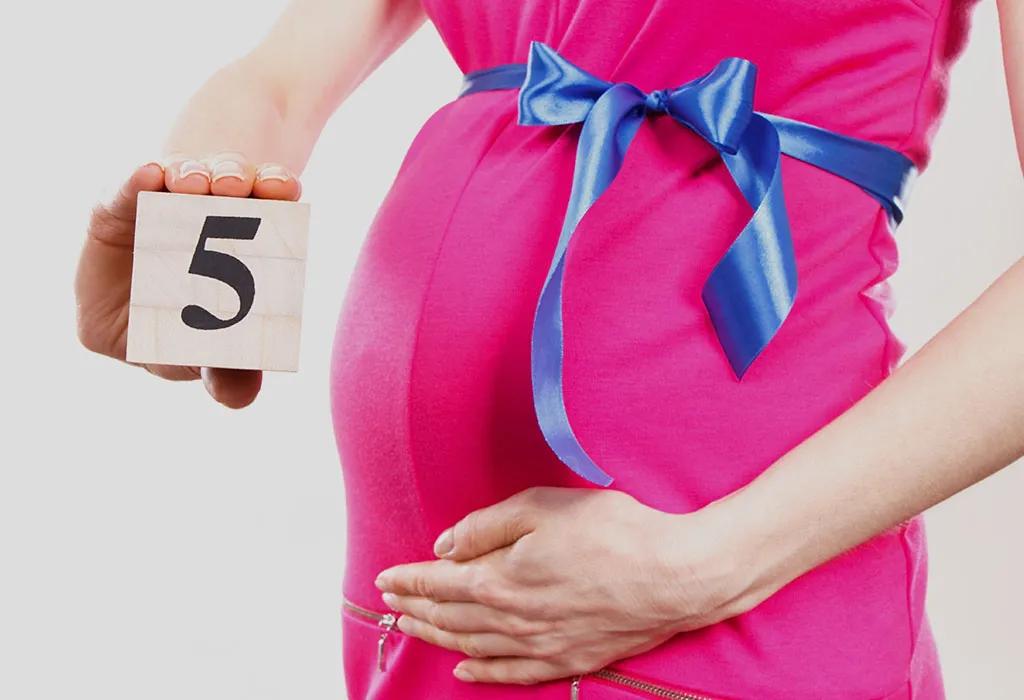

Almost every woman looks forward to being a mother, and pregnancy is only the beginning of a great adventure. It is during this time that a woman needs to be very cautious and strict with her diet. During your fifth month, you will need to consume at least 347 extra calories per day and gain about one or two pounds of weight. These calories should come from protein and calcium sources. Do everything you can to avoid getting them from fatty additives, sugar and carbohydrates. In this article, we have covered the topic 5th month pregnancy diet chart. We have mentioned the foods that should and should not be a part of your pregnancy diet at this time.
What to Eat in the Fifth Month of Pregnancy
Here we have listed some foods that you should include in your 5th month pregnancy food chart:
1. Protein-rich Foods
Foods rich in protein ensure that your baby’s physical development is going smoothly, as the amino acids in protein are the building blocks of the body. Pulses, cereals, seeds and nuts, chickpeas, cottage cheese, and tofu are some foods that are good sources of protein for you and make great 5-month pregnancy food.
2. Whole Grains
These are very rich in magnesium, iron, Vitamin E, and Vitamin B complex. Whole grains consist of all three parts of the grain, which are the endosperm, bran and germ. Breakfast cereals, atta flour, bread and so many other things are made from whole grains.
3. Calcium-rich Foods
We all know that calcium is good for our bones and teeth, and it is no different for your developing baby. Make sure to consume plenty of foods rich in calcium to ensure a strong skeletal system for your child. Fruits like kiwi, mulberries, dried figs and dates are rich in calcium.
4. High-fibre Foods
Constipation is a well-known problem during pregnancy. Foods rich in fibre are the best way to reduce the chances of it happening. Fruits and vegetables, barley, oats, wheat and nuts are some foods that are rich in fibre.
5. Salads
Get into the habit of eating salads if you don’t already. You can get quite creative with salads, and they are a great way to get the essential nutrients, minerals and fibres your body will need. Avoid using salad dressings and pickled vegetables, however, as these are high in sodium content.
6. Fruits
Apples, grapes, bananas, avocados, pears, oranges, peaches and so many more. There are so many fruits to choose from that you won’t feel bored eating one. They are also high in minerals and vitamins, which is essential during the second trimester of pregnancy.
7. Water
Okay! Water is not a food but it is essential – and you know it! Staying hydrated has so many benefits for the human body and it is all the more important during pregnancy. It keeps constipation and urinary tract infection at bay, which are two common problems faced by pregnant women. Drinking a lot of fluids also helps to detoxify your body. If you are someone who doesn’t like to drink plain water, drink fresh juices like sugarcane and mango, which contain healthy carbohydrates and fibre.
8. Green Vegetables
While consuming a large quantity of green vegetables may seem repetitive, it’s crucial for the well-being of your little one. Incorporating nutrient-rich options like spinach, fenugreek, kale, and broccoli into your diet helps meet the body’s requirements for iron and vitamin A.
9. Carb-rich Foods
Starchy, carbohydrate-rich foods such as pasta, potatoes, and bread are crucial in a pregnancy diet. They provide a high energy source and are considered essential components for a healthy and balanced pregnancy diet.
10. Milk
In the fifth month of pregnancy, milk is highly recommended due to its high calcium content. Calcium is essential for proper bone development, as well as for strengthening teeth and muscles. While some may feel uneasy about drinking milk during pregnancy, there are alternative dairy products available that can also provide these vital nutrients for your health.
11. Grains
Grains are essential in a pregnancy diet, encompassing products like bread, wheat, rice, and corn. These foods are rich in vital nutrients such as vitamin E and vitamin B, crucial for the healthy development of the baby. They also supply essential elements like iron and magnesium, which are necessary for the baby’s well-being. The proper nourishment of the baby greatly relies on the inclusion of these grain-based products.
What Not to Eat During the Fifth Month of Pregnancy
Though you may have cravings, here are some things that you should stay clear of during your pregnancy:
1. Carbonated Drinks
Fizzy drinks have a lot of unhealthy calories, sugar and caffeine. Ditch these for some fresh fruit juices or stick to fresh lime water.
2. Certain Fruits and Vegetables
Fruits such as pineapples, pomegranates and papayas, which are known to cause uterine contractions should not be consumed in excess. Vegetables like cabbage, lettuce, and the eggplant should be consumed in moderation too.
Furthermore, all fruits and vegetables should be consumed after washing them properly.
3. Caffeine
Too much caffeine during pregnancy causes restlessness and sleeplessness in babies after they are born. Tea, coffee and chocolate contain caffeine, and so it is best to avoid it altogether, but if you are someone who feels you really cannot go without caffeine, reduce the quantity to a maximum of two cups per day.
4. Smoked and Raw Seafood
If you love sushi and sashimi, it is time to take a break. Smoked seafood most often contains listeria monocytogenes bacteria, which causes listeriosis, leading to stillbirths, miscarriages or illnesses in newborns.
5. Fish Containing Mercury
Mercury is found in the ocean, streams and lakes. It converts into methylmercury inside the human body, which is a neurotoxin and may cause brain damage and developmental delays in infants. Fish like shark, swordfish, king mackerel and tilefish are some fish to avoid. Go for salmon or light meat tuna.
6. Raw or Undercooked Eggs and Meat
Unless you are vegan, eggs and meat are bound to be a huge part of your diet. Make sure you never have raw eggs or meat and that they are always well-cooked. Raw eggs contain bacteria called salmonella which causes food poisoning. While your bout of food poisoning may not harm your baby, your immune system will be weakened, and that can have a negative impact on your baby’s development. Raw meat contains the toxoplasma parasite which can lead to fetal death during delivery or miscarriages during pregnancy.
7. Herbal Teas and Supplements
There are certain herbal ingredients that are used in tea, seasonings or supplements, which could be very harmful to the mother and child. So herbal teas and supplements should be consumed in moderation and after checking with a doctor. If you prefer drinking green tea, make sure you don’t consume it in excess amounts. Limit your consumption to 1-2 cups a day. Better yet, speak to your gynaecologist and nutritionist before making it a daily part of your pregnancy diet.
Diet Tips for a 5-month Pregnant Woman
Here are some tips for maintaining a balanced diet during this crucial time of your life:
Research the nutrition content of the food that you eat on a daily basis and try to work out how much you need to consume every day and what part of your diet needs to be changed if any.
Set up a meal plan for yourself to ensure your body is getting the right amount of nutrients that it requires to grow your baby.
Consult with your doctor about any food items in your meal plan that you may be allergic to and what you can substitute it with.
Eat less quantity in one sitting and more frequently throughout the day.
Choose dried fruits, nuts and seeds if you feel the need to munch on something. You can also have baby carrots and other vegetables as snacks between meals.
Your height and weight before pregnancy will be important when it comes to how much of each food group you need to eat in order to maintain a healthy and balanced diet. For this, it is always best to get the advice of your doctor or a nutritionist.
FAQs
1. What Vitamins and Minerals Are Essential for Your 5th Month Pregnancy Diet?
During pregnancy, it’s essential to prioritize vitamins A, C, D, B6, B12, and folic acid. Essential minerals to add to your 5th month pregnancy diet may encompass calcium, iron, iodine, and choline.
2. What Types of Snacks Can You Consume During Your Fifth Month of Pregnancy?
In terms of snacking, consider incorporating nutritious options like probiotic-rich yoghurt or smoothies blended with cocoa, berries, nut butter, or avocado to enhance nutrition and support metabolism. Additional choices may include hard-boiled eggs, soaked or roasted nuts, salads with beans, and vegetable dips with hummus.
3. How Should I Determine Appropriate Serving Sizes for the Fifth Month of Pregnancy?
During their second trimester, pregnant women who maintain an ideal weight and engage in regular exercise can aim to include approximately seven ounces of grain-based foods (such as bread, rice, or pasta), three cups of vegetables, six ounces of proteins (including eggs, lean meat, seafood, and beans), three cups of dairy, and limit fats and oils to around seven teaspoons (opting for sources like olive oil, avocado, and nuts). This balanced approach helps ensure they receive a diverse range of essential nutrients for a healthy pregnancy.
4. How Much Weight Should You Expect to Gain During Fifth Month Of Pregnancy?
During the second and third trimesters of pregnancy, it is generally recommended for most women to aim for a weekly weight gain of around one pound (equivalent to 0.5 kilograms). It’s important to note that this can differ based on the initial body weight at conception and whether the pregnancy involves multiple fetuses.
It may be difficult to suppress some of the cravings that you may get for good old street food every now and then, but try not to indulge for the sake of your baby. In fact, try to keep all your unhealthy food cravings under control or substitute them with the healthy food that will be beneficial for both you and your baby. What you consume will have a direct impact on not just you but also your baby. Nothing is more important than the health and safety of your baby, so always remain aware and cautious of what you are consuming.
References/Resources:
1. Iron-rich Foods for Pregnancy; americanpregnancy.org; https://americanpregnancy.org/healthy-pregnancy/pregnancy-health-wellness/iron-rich-foods-for-your-pregnancy/
2. What Is a Superfood, Anyway?; health.clevelandclinic.org; https://health.clevelandclinic.org/what-is-a-superfood/
3. Managing your weight gain during pregnancy; medlineplus.gov; https://medlineplus.gov/ency/patientinstructions/000603.htm#
4. Nutrition During Pregnancy; waterburyhospital.org; https://www.waterburyhospital.org/all-services/womens-health-program/obstetrics-and-gynecology/patient-education-folder/nutrition-during-pregnancy/
5. Pregnancy nutrition: Foods to avoid during pregnancy; mayoclinic.org; https://www.mayoclinic.org/healthy-lifestyle/pregnancy-week-by-week/in-depth/pregnancy-nutrition/art-20043844
6. What to eat and what not to eat when pregnant; osfhealthcare.org; https://www.osfhealthcare.org/blog/what-to-eat-and-what-not-to-eat-when-pregnant/
7. The Eats and Don’t Eats of Pregnancy; healthyfuturesonline.org; https://healthyfuturesonline.org/library/the-eats-and-dont-eats-of-pregnancy/
8. How much should I eat during pregnancy?; tommys.org; https://www.tommys.org/pregnancy-information/im-pregnant/nutrition-in-pregnancy/how-much-extra-should-i-eat-pregnancy
Also Read:
Sixth Month of Pregnancy Diet
Seventh Month Pregnancy Diet
8th Month Pregnancy Diet Chart
Sixth Month of Pregnancy Diet (21-24 Weeks)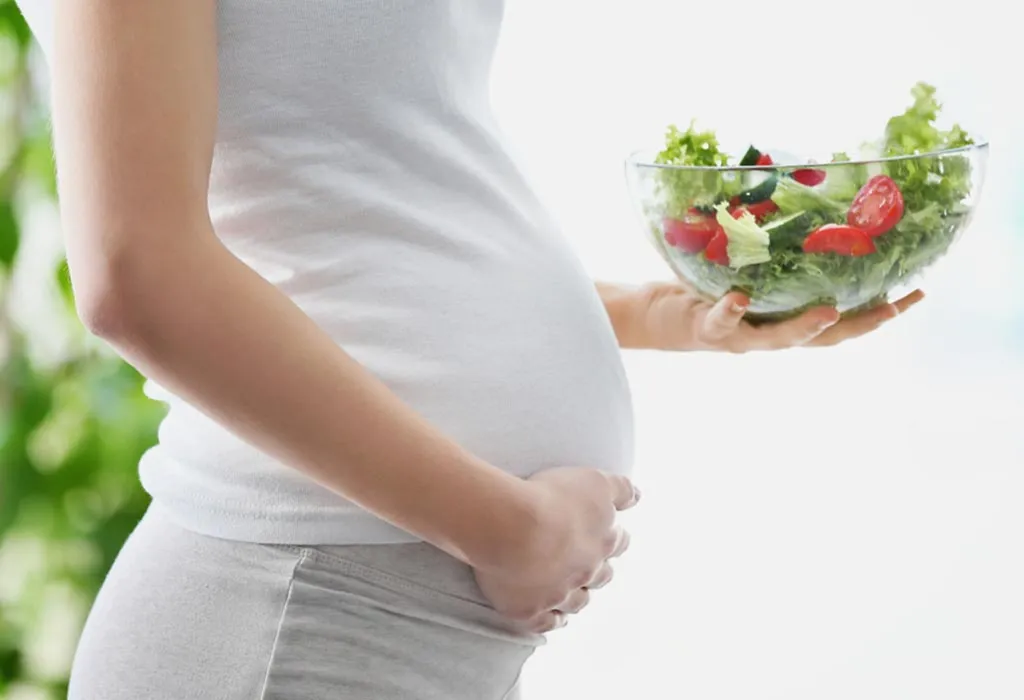

As you journey into the 6th month of pregnancy, a notable shift occurs as your growing baby establishes a more defined pattern of activity and rest within the womb. Simultaneously, your body continues to undergo a series of changes, bringing forth a myriad of symptoms. You may find yourself grappling with swelling in your hands and feet, grappling with lower back pain, experiencing gastrointestinal discomfort, noticing an increase in vaginal discharge, and perhaps even encountering bleeding gums. These bodily transformations are typical during this stage of pregnancy, reflecting the intricate process of your baby’s development and your body’s adaptation to accommodate it. We’ll now take a look at what a 6th month pregnancy diet plan looks like.
Foods to Include in a 6-Month Pregnancy Diet
You will have begun experiencing hunger like you haven’t felt before – both frequently and intensely. Here is a list of what to eat in the 6th month of pregnancy.
1. Vitamin C
Due to the high volume of blood in your body at this stage of pregnancy, you may begin experiencing bleeding gums. If the condition worsens, it could lead to gingivitis. Consume a high amount of vitamin C during this month as it is essential for repairing and maintaining connective tissue all over the body, including tissue that binds teeth to the gums and the jaw bone.
Citrus fruits such as oranges, lemons, and tangerines are rich in vitamin C. Other sources of vitamin C are strawberries, grapes, cabbage, and sweet potato.
2. Vegetables
The further your pregnancy progresses, the more you will be vulnerable to constipation and indigestion. Studies suggest that most women will have haemorrhoids during the course of their pregnancy. Fibre found in vegetables is an essential part of the 6-month pregnancy food chart as it provides roughage which aids regular, healthy bowel movements. Along with good amounts of fibre, vegetables are rich in various types of vitamins and minerals.
3. Fluids
Remember that as a pregnant lady, you are not just eating for two but also drinking for two. Staying hydrated means consuming a minimum of 8 glasses of water a day. In addition to that, you should get some smoothies and juices into the mix for your overall wellness. Staying hydrated is important in the list of food for a 6-month pregnant woman. Fighting constipation is essential, so drink up!
4. Folic Acid
Folic acid is a complex vitamin which is necessary for the building of new cells. It is especially important to incorporate sources of folic acid into the list of foods to eat during the second trimester as your foetus’ brain undergoes rapid development towards the end of 24 weeks.
Foods rich in folic acid are whole-grain bread and cereals, green vegetables (broccoli, spinach and lettuce), flax seeds, sunflower seeds, pumpkin and sesame seeds, peanuts, and almonds. It is also found in certain fruits and vegetables such as okra, peas, grapes, and bananas.
5. Protein
Considering that it is the building block of cells, protein is always welcome. Unlike carbohydrates, proteins do not readily convert into fats to be stored for later use.
Foods rich in protein are dairy products, eggs, and lean, white meat. Other sources of protein that are popular in Indian cuisine are legumes and pulses.
6. Carbohydrates
Like proteins, carbohydrates are an essential nutrient for day-to-day activities. Carbohydrates are burnt by the body for energy. Excess carbohydrates are converted to fat and stored in cells.
Refined carbohydrates like polished rice (without the husk) and white bread quickly break down into sugars, leading to spikes in the blood glucose level. Thus, it is wise to stick to whole-grain bread and brown rice. Wheat, oatmeal, and cereals are also good sources of carbohydrates.
7. Fruits
Fruits provide a variety of vitamins, minerals, and essential roughage to aid digestion. Also, since water is a major constituent of most fruits, it helps you stay hydrated.
Consuming a large variety of fruits can help ensure you are getting all the micronutrients you require. For example, Pears contain phosphate, vitamin C, potassium, and copper; Apples contain antioxidants, B-complex, iron, and phytonutrients; Bananas contain potassium, vitamin B-6 and vitamin C, etc.
8. Iron
Iron is crucial during pregnancy to support the increased production of blood to supply oxygen to both you and your growing baby. Insufficient iron intake can lead to anemia, causing fatigue and weakness. Incorporate iron-rich foods into your diet, such as lean meats, poultry, fish, beans, lentils, tofu, fortified cereals, and dark leafy greens like spinach and kale.
9. Omega-3 Fatty Acids
Omega-3 fatty acids play a vital role in fetal brain and eye development. Include sources of omega-3s such as fatty fish like salmon, mackerel, and trout, as well as flaxseeds, chia seeds, walnuts, and soybeans in your diet to promote healthy neurological development in your baby.
Foods to Avoid During the Sixth Month of Pregnancy
According to the American Pregnancy Association, some foods can adversely affect you and your baby if consumed during the 6th month of your pregnancy (1). Here is the list:
1. Seafood
A lot of pregnant women may want to consume raw seafood items such as sushi, but it may not be the best idea. Most seafood contains trace amounts of mercury, as compounds containing mercury (methylmercury) do not decompose easily in saltwater but are broken down by the action of vegetative matter in freshwater. While adult bodies may not be affected adversely by small amounts of mercury, it is best to avoid contact during pregnancy as your baby’s brain is still in its early stages of development.
2. Caffeine
High caffeine intake has been linked to restlessness and sleeplessness in newborns. Caffeine intake by the mother will increase the foetus’ heart rate and increase its chance of developing a dependency. Also, since a foetus has no developed system to detoxify, the caffeine stays in its system for longer than it may in a grown up’s.
3. Soy
Phytoestrogens are compounds found in soy and certain herbs used to boost fertility. Phytoestrogens take on the role of natural estrogen and bind with estrogen receptors. This makes it a useful addition for women attempting to conceive. However, if you are already pregnant, these false hormones can adversely affect the development of your baby’s brain, sexual organs, and immune system.
4. Fast Food
Lots of pregnant women crave greasy fast food during pregnancy. Most people, regardless of whether they are pregnant or not, get sudden cravings for fast food! The high amount of calories in fast food can cause your blood glucose levels to spike and drop fast. These extremes can cause irritability, tiredness, and in the long run, impairment of vital organs.
Fast food can contribute to gestational diabetes, which is a condition where pregnant women develop high blood sugar. If left unchecked, this could lead to permanent health issues in the foetus.
5. Undercooked Meat
Always make sure that, when eating chicken or other meats, you are consuming only well-cooked food. If undercooked, bacteria called Listeria bacterium (found in meat) could be transferred into your body, causing Listeriosis. Listeriosis is food poisoning that can result from eating contaminated vegetables, undercooked meat, and unpasteurised dairy products (2). In pregnant women, it can lead to miscarriage.
6. Spicy Food
Spicy foods are not unsafe for your growing baby. However, during the later stages of pregnancy, it can cause heartburn, indigestion, and general discomfort, so it is best avoided during the latter stages of pregnancy.
7. Alcohol and Tobacco
It is well known that tobacco and alcohol need to be completely avoided during pregnancy (3). Avoiding these drugs is recommended even when trying to conceive! These drugs can severely affect the development of your foetus.
8. Raw Eggs
Raw eggs are a complete no-no for pregnant women. Raw eggs contain salmonella bacteria that can cause problems for you and the foetus. Thus, make sure your eggs are cooked through before you consume them.
9. Soft Cheeses
Soft cheeses such as brie and camembert should also be avoided as they can cause listeria infection, which can be fatal to both the mother and the baby.
Supplements That You Can Take During the 6th Month of Pregnancy
During the sixth month of pregnancy, supplements can play a crucial role in ensuring that both you and your baby receive essential nutrients for optimal health and development. While a balanced diet is important, certain supplements can help fill any nutritional gaps and support specific needs during this stage of pregnancy.
1. Prenatal Vitamins
Prenatal vitamins are specially formulated to provide additional vitamins and minerals necessary for a healthy pregnancy. They typically contain folic acid, iron, calcium, and other essential nutrients vital for fetal development and maternal well-being.
2. Iron
Iron supplementation may be recommended to prevent or treat iron deficiency anemia, which is common during pregnancy due to the increased demand for iron by both the mother and the developing baby. Iron helps in the production of hemoglobin, which carries oxygen to the cells in your body and to your baby.
3. Vitamin D
Vitamin D is essential for calcium absorption and bone health, both for the mother and the baby. During the sixth month of pregnancy, supplementing with vitamin D can help ensure adequate levels, especially if sun exposure is limited or if you have certain risk factors for deficiency.
4. Omega-3 Fatty Acids
Omega-3 fatty acids, particularly DHA (docosahexaenoic acid), are crucial for fetal brain and eye development. While you can obtain omega-3s from foods like fatty fish and flaxseeds, supplementation may be recommended to ensure sufficient intake, particularly if your diet is lacking in these nutrients.
5. Calcium
Calcium is necessary for the development of your baby’s bones and teeth, as well as for maintaining your own bone health. Supplementing with calcium can help meet the increased demand during pregnancy, especially if dietary intake is insufficient. Look for calcium supplements that also contain vitamin D for better absorption.
Diet Tips for a 6 Months Pregnant Woman
Avoid taking any over-the-counter medication.
If you take any regular medication, it is of utmost importance that you consult your doctor on their use during pregnancy.
Cravings are a natural part of pregnancy! Create a habit of indulging in healthy cravings like fruit and vegetables.
Craving greasy fast food is normal during pregnancy and otherwise. Only indulge these cravings once or twice a week and try to keep it to small portions.
When it comes to food during 6th month of pregnancy, after finishing a small portion of fast food or other kinds of heavy food, do not refill your plate immediately. Sitting down and waiting for a few minutes can curb your desire to get a refill as it takes some time for your stomach to signal to your brain that it is full and doesn’t need refreshment.
Make sure you take all your supplements as they can play a huge role in your hunger patterns.
FAQs
1. Are there any foods I should avoid during this stage of pregnancy?
While many foods are safe to consume during pregnancy, it’s essential to avoid certain foods that may pose a risk of foodborne illness, such as unpasteurized dairy products, raw seafood, and undercooked meats. Additionally, limit your intake of caffeine and avoid alcohol entirely.
2. How can I manage common digestive issues like constipation and indigestion during the sixth month of pregnancy?
In terms of 6th month pregnancy food, increasing your intake of fiber-rich foods, staying hydrated, and eating smaller, more frequent meals can help alleviate constipation and indigestion. Additionally, avoiding spicy and greasy foods may help reduce discomfort.
3. Is it safe to consume fish during pregnancy?
Yes, certain types of fish are safe to eat during pregnancy and are a valuable source of protein and omega-3 fatty acids. However, it’s essential to choose low-mercury options such as salmon, trout, and sardines and limit consumption of high-mercury fish like shark, swordfish, and king mackerel.
This was all about what to eat in the sixth month of pregnancy. A balanced diet leads to a healthy mommy, and a healthy mommy creates a healthy baby! We hope the 6th month pregnancy diet chart given above helps you during this journey!
References/Resources:
1. Foods to Avoid During Pregnancy; American Pregnancy Association; https://americanpregnancy.org/healthy-pregnancy/pregnancy-health-wellness/foods-to-avoid-during-pregnancy/
2. People at Risk: Pregnant Women; FoodSafety.gov; https://www.foodsafety.gov/people-at-risk/pregnant-women
3. Centers for Disease Control and Prevention; https://www.cdc.gov/tobacco/basic_information/health_effects/pregnancy/index.htm
4. Pregnancy Nutrition; American Pregnancy Association; https://americanpregnancy.org/healthy-pregnancy/pregnancy-health-wellness/pregnancy-nutrition/
5. Nutrition During Pregnancy; Johns Hopkins Medicine; https://www.hopkinsmedicine.org/health/wellness-and-prevention/nutrition-during-pregnancy
6. Healthy Weight during Pregnancy; EatRight.org; https://www.eatright.org/health/pregnancy/prenatal-nutrition/healthy-weight-during-pregnancy
7. Vegetarian or vegan and pregnant; NHS; https://www.nhs.uk/pregnancy/keeping-well/vegetarian-or-vegan-and-pregnant/
Also Read:
Four Month Pregnancy Diet
5th Month of Pregnancy Diet
Pregnancy Diet for Seven Month
Seventh Month Pregnancy Diet – Foods to Eat and Avoid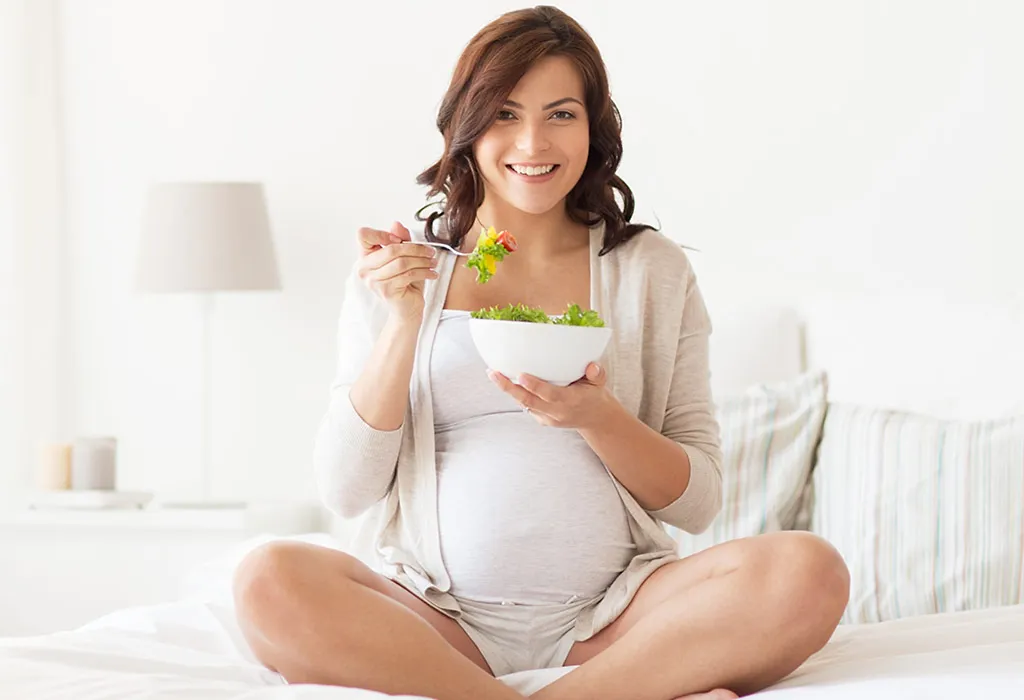

You are in the third trimester of your pregnancy, which is the last leg of your pregnancy journey, and you are slowly inching to the most awaited day of your life. Your body and your baby are going through tremendous changes. To ensure that your pregnancy progresses just fine, you need to maintain a healthy diet. You will need to structure your diet in a way that will work around the needs of your nutrition at this stage and also keep a check on your weight. Your stomach with rumble more than often as your baby is now preparing for its life once it is outside.
Health experts recommend that at least an additional 450 calories to ensure that your baby gains from nutrition needed at this stage. So, the big question is what should you eat to strike this balance between nutrition and weight control? There are plenty of options – read on to find out about a diet plan for a 7-month pregnancy!
What Foods Should You Include in Your Diet in the Seventh Month of Your Pregnancy?
A healthy third-trimester diet during pregnancy has many elements. Your pregnancy diet plan can comprise all the essential nutrients and you must eat in moderation. Avoid overeating because you will feel severe hunger pangs during this period. Here’s a 7 month pregnancy food chart where you’ll learn more about what foods to eat during the 7th month of pregnancy.
1. Foods Rich in Iron and Protein
Your body will need an extra dose of iron in the third trimester of your pregnancy to prevent anaemia or haemorrhage during delivery or even premature delivery. You would need approximately 27 mg of iron every day (1). Dark green vegetables like spinach, turnip leaves, dried fruits like raisins and apricots, pumpkin and sesame seeds, soya beans, red meat and poultry are all iron-rich foods that you can include in your diet. Protein is also important for the healthy growth of the baby. The amino acids present in protein-rich foods like eggs, meat, lentils, chickpeas, pulses and dairy products will provide you with the recommended 75-100 gms of protein a day.
2. Foods Rich in Calcium
Intake of calcium in the third trimester of pregnancy is considered very crucial as eating calcium-rich foods will aid in the healthy development of your baby’s skeletal system and a robust bone structure (2). You must aim to get 1000 gm of calcium every day through your diet. You can include dairy products like milk, cheese, paneer and yoghurt as they are rich in calcium.
3. Foods Rich in Magnesium
Along with calcium, you will also need magnesium in a proportionate amount in order to assimilate the calcium. Magnesium will help alleviate leg cramps, relax muscles and also prevent premature delivery (3). You need 350 mg of magnesium daily while pregnant. You can include black beans, oat bran, barley, artichoke, almonds and pumpkin seeds in your diet, as they are rich sources of magnesium.
4. Foods Rich in DHA
A fatty acid, DHA is essential if you want a child with brains and brawns. A daily intake of 200 mg is recommended for the development of the baby’s brain. Fish oil, fatty fish like tuna, walnuts and flax seeds are some foods loaded with DHA – so include these in your pregnancy diet (4).
5. Foods Rich in Folic Acid
Folic acid lowers the risk of any neural tube defects and aids in the development of a healthy neural system. Make sure you get at least 400 mg of folic acid daily through your pregnancy diet (5). You can eat dark leafy vegetables, oranges, oatmeal, whole grain bread and fortified cereals to get the recommended dose of folic acid.
6. Foods Rich in Fibre
A fibre-rich diet can help clean the bile and prevent constipation. The water in your digestive tract is absorbed by your fibre intake so make sure you drink lots of water. Constipation is common in the third trimester so include, fresh fruits and vegetables, legumes and whole grains in your diet.
7. Foods Rich in Vitamin C
Increasing your intake of Vitamin C will help in the proper absorption of iron during pregnancy. Citrus fruits like lemons, oranges and melons, green pepper and broccoli are rich sources of Vitamin C.
Foods to Avoid in the Seventh Month of Pregnancy
Just when you know what to eat, bear in mind it is equally important to know what not to eat during this stage. Heartburn, swollen feet and hands, fatigue and constipation, are some common problems that you might experience during this stage of pregnancy. Eating certain foods will certainly aggravate these issues, and it is better to eliminate them from your diet.
1. Spicy and Fatty Foods
Foods high in fat and spice, especially fried food will increase the discomfort of heartburn. They are difficult to digest and may hinder your sleep. Avoid eating fried foods at night.
2. Foods High in Sodium
It is important to keep a check on your sodium intake at this stage of pregnancy. High intake of sodium will lead to swelling and bloating. Avoid crisps, pickles, sauces, canned food and ketchup. Drink plenty of fluids and water to regulate your sodium levels in your body.
3. Caffeine and Fizzy Beverages
Coffee and tea should be completely avoided during pregnancy. But if you want to drink them, restrict yourself to just one cup a day as it could lead to constipation. Fizzy drinks are loaded with artificial sugar and sweeteners and provide absolutely zero nutrition, so they are best avoided.
4. Alcohol
Alcohol is definitely not recommended at any stage of your pregnancy (6). At this stage, it is imperative that you do not even think of consuming it as it could hinder your delivery process.
5. Junk Food
You may crave for fried chicken or a burger, but these junk foods are best avoided during pregnancy. Avoid these junk foods and opt for homemade snacks like sandwiches, upma, dhokla, etc.
Dietary Tips for Seven Months Pregnant Women
Here are some dietary tips that you should follow in the seventh month of your pregnancy.
Your morning breakfast should comprise fresh fruits and a glass of milk. Include some servings of fortified cereal for iron intake. You could even have some boiled legumes and beans to meet your protein requirements. Eggs, dry fruits, and milk should also be consumed on a daily basis. Have a heavy breakfast as your body has all day to digest it.
In the afternoon, your lunch should include a balanced proportion of cooked vegetables, salads, bread, chapati, and rice. Eat more starchy foods rather than sugary foods. Also, include foods high in protein.
Your 4 pm snack should not be heavy. If you feel hungry, eat something light like makhana, dry fruits, or fruits.
Keep your dinners light as you will want to avoid symptoms of heartburn and constipation. Stick to salads and fresh fruits to get a good night’s sleep.
FAQs
1. Can I consume seafood during 7th month of pregnancy?
It’s generally safe to consume seafood as part of a 7-month pregnancy diet, but certain types high in mercury should be limited or avoided. Opt for low-mercury options like salmon, shrimp, and trout. Avoid raw or undercooked seafood to prevent foodborne illnesses.
2. Are there any foods to help with vomiting and nausea during the 7th month of pregnancy?
In a 28-week pregnancy diet, ginger, crackers, small frequent meals, and staying hydrated with fluids like water, ginger tea, or clear broths can help alleviate nausea and vomiting during pregnancy. Avoid spicy, greasy, or overly strong-smelling foods.
3. How much water should I drink during the 7th month of pregnancy?
Pregnant women should aim to drink about 8 to 12 cups (about 2 to 3 liters) of water per day during pregnancy. However, individual needs may vary based on factors like activity level, climate, and overall health. It’s important to stay hydrated but avoid excessive water intake.
A healthy and nutritious seven month pregnancy diet will not only benefit you but your baby too. Since you are now getting bigger, it is a good idea to get some exercise to offset the calories that you intake and control weight gain. Parental yoga, swimming, and walking are great options to check weight gain and will keep you strong and fit for normal delivery.
References/Resources:
1. Alwan. N, Greenwood. D, Simpson. N, McArdle. H, et al.; Dietary iron intake during early pregnancy and birth outcomes in a cohort of British women (Human Reproduction); Oxford Academic; https://academic.oup.com/humrep/article/26/4/911/626922; February 2011
2. Nutrition During Pregnancy FAQs; The American College of Obstetricians and Gynecologists; https://www.acog.org/womens-health/faqs/nutrition-during-pregnancy
3. Magnesium; Mount Sinai; https://www.mountsinai.org/health-library/supplement/magnesium
4. Healthy Eating During Pregnancy; Food Insight.org; https://foodinsight.org/healthy-eating-during-pregnancy/
5. Folic acid; Office on Women’s Health; https://www.womenshealth.gov/a-z-topics/folic-acid
6. Fetal Alcohol Spectrum Disorders (FASDs); Centers for Disease Control and Prevention; https://www.cdc.gov/ncbddd/fasd/data.html#:~:text=Using%20medical%20and,of%201%2C000%20children
7. The Third Trimester; Stanford Medicine; https://www.stanfordchildrens.org/en/topic/default?id=third-trimester-85-P01242
Also Read:
5th Month Pregnancy Diet
6th Month Pregnancy Diet
Pregnancy Diet for Eight Month
Diet for Nine Month of Pregnancy
8th Month Pregnancy Diet (29-32 Weeks)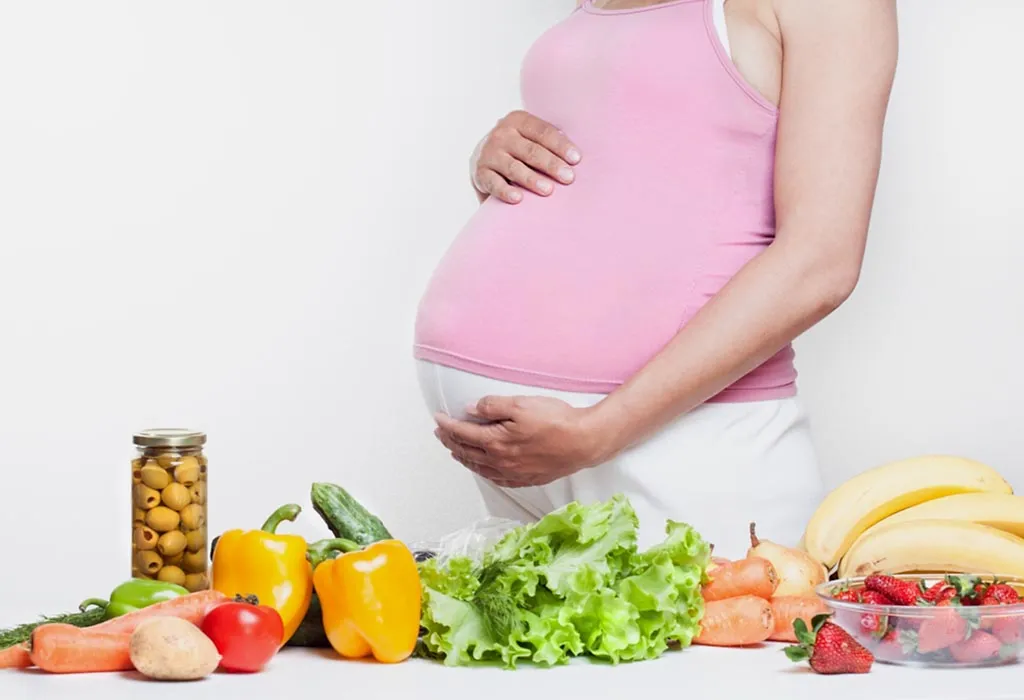

An important aspect to care for during pregnancy is your diet, as it can affect the health of the baby, as well as your mental and physical well-being in a number of ways. Your pregnancy diet should be created with the utmost care, keeping in mind the effects of the food items on the growing baby. At eight months, you’re almost at the last leg of your pregnancy journey. Your baby has been well taken care of all these months, and it’s important to continue the same. A good 8-month diet in pregnancy ensures that the little one is getting enough nutrients and stays healthy.
Let us look at some foods that should be avoided and some food items which can be had safely during the eighth month of pregnancy.
What to Expect During the Eighth Month of Pregnancy?
1. Gaining Weight
The foetus gains weight quite quickly during the eighth month, which means so will the mother. If you haven’t noticed much weight gain in the previous months, this month more than makes up for the delay.
2. Frequent Urination
As the baby grows larger, there is increased pressure on the bladder, causing you to pee more frequently. This may make many women drink lesser water, as constantly wanting to pee can cause discomfort. However, it is vital to stay hydrated during pregnancy, so be smart about your intake of fluids by eating fruits with high water content, drinking lesser water at night, etc.
3. Shortness of Breath
The mother’s enlarged uterus pushes against the diaphragm, a muscle involved in breathing, causing shortness of breath. It is advised to wear loose clothing to feel more comfortable
4. Heartburn or Acidity
As the uterus grows quite a bit during the third trimester, it puts pressure on the stomach and intestines, increasing the risk of acidity. Eating non-spicy, easier to digest foods relives this issue.
What Are The Changes In the Nutritional Needs During the 8th Month Of Pregnancy?
During the eighth month, the foetus begins to store fat and glycogen under the skin and in the liver, making it important to consume enough carbohydrates, to avoid a protein deficiency. Weight gain should be restricted to 350 grams per week, so you will need to adjust your diet accordingly and consume a range 0f millets, oatmeal, wheat, and more. This is also a peak period for foetal brain growth, so eat foods rich in fatty acids such as linoleic acid. Your body is slowly preparing for childbirth, so adding enough iron- and calcium-rich food will give you the nutrients and strength needed.
Food to Eat During the Eighth Month of Pregnancy
Below are some foods that can be eaten during the eighth month of pregnancy:
1. Fish
Fish contains a large amount of iron, which is important during pregnancy. Iron deficiency results in anaemia, which can cause a feeling of general fatigue in the mother. Fish also has other important nutrients like protein, which makes it a great addition to the 8th-month pregnancy diet chart.
2. Red Meat
Red meat is another great addition to the diet of an expecting mother, as it is also a rich source of iron and protein. Both of these are essential minerals to the mother, as they help accelerate the growth of the baby. Red meat can improve the general health of the mother, too, as it contains minerals that keep you from being tired or sick during pregnancy.
3. Bananas
One of the most underrated fruits, bananas have been a great source of essential vitamins and minerals since ancient times. Bananas are rich in potassium, calcium, and iron, making it a must-have in any woman’s diet. On top of that, they also promote digestion and relieve constipation, increasing the comfort of the expectant mother in great ways, as they are a rich source of soluble fibre.
4. Dairy Products
There is a reason why dairy products are so heavily promoted among children during their formative years. Dairy products, including milk, are a non-exhaustive source of vitamins and minerals, including calcium, potassium, proteins, and the likes. Consuming dairy products during the last month of pregnancy can have a telling effect on the growth of the baby.
5. Leafy Vegetables
Fibre-enriched foods are important during pregnancy, as they help prevent the feeling of constipation that occurs due to excess weight and excess hormone secretion during the third trimester. Leafy vegetables contain more than enough fibre, along with other minerals like iron, potassium, and calcium. They are a great addition to the 8th-month pregnancy Indian diet of an expecting mother.
6. Peanut Butter
Fat is a necessity for the body during the final trimester, though many people seem to assume otherwise. While foods high in fats are strictly off-limits, vital fatty acids still remain an important part of the diet of a pregnant woman. Omega-3 is an example of a vital fatty acid that contributes greatly to the development of the brain of the foetus. Other sources of good fats like peanut butter are eggs and fish.
7. Oranges
Apart from having large amounts of fibre, orange also contains a large amount of Vitamin C, which is an essential nutrient for the body. Vitamin C is important, as helps in absorption of iron. Other sources of Vitamin C include tomatoes, lemons, and cabbages.
8. Whole Grains
Whole grains are rich in fibre, folic acid, vitamins, and minerals, all of which provide the mother with energy while also ensuring proper development in the baby. You can eat plenty of barley, quinoa, and oatmeal, among others. Also, pick brown bread or brown rice over white bread or rice, as it contains more fibre and breaks down slowly, allowing your body to absorb the nutrients better. These are one of the best foods for 8-month pregnancy.
Foods Not to Include in the Eighth Month of Pregnancy Diet
Here are some foods that can cause harm to either you or the foetus:
1. Unpasteurised Milk
In many Indian households, drinking unpasteurised milk is the norm. This has to be strictly avoided during the third trimester of pregnancy, as the milk is not processed enough to be deemed safe for consumption. Goat milk should be avoided, anyway, as if consumed unpasteurised, it may cause a fatal condition called toxoplasmosis.
2. Coffee
Caffeinated items are a strict no-no in the last stages of pregnancy, as they can cause constipation and gastric problems. You can, instead, opt to consume large amounts of water, which is a necessity, even during normal times. Coffee is one of the third-trimester foods to avoid for any expectant mother.
3. Alcohol and Tobacco
This goes without saying, but alcohol and tobacco must be avoided at any stage of the pregnancy, especially in the third trimester. They can cause complications at the time of delivery and also have an impeding effect on the development of the fetus.
4. Fried Foods
Fried food items should be avoided during your third trimester of pregnancy, as they add little to your diet in terms of nutritional value. Fried foods can also cause gastrointestinal problems, including improper digestion and heartburn, which can be extremely uncomfortable when you are carrying a child.
5. Shark, Marlin, and Swordfish
These type of fish items must be avoided during pregnancy, as they have high levels of a detrimental substance called methylmercury. Methylmercury can cause complications in the development of the nervous system of the fetus, so choose fish that have the required nutritional value and are not too fatty for consumption.
6. Liver and Cured Meats
Liver and other cured meats must be avoided in the entirety of the pregnancy, not just in the third trimester. Cured meats like salami and ham increase the risk of toxoplasmosis and listeriosis in the unborn child, making it strictly off-limits for any expectant mother during the time of pregnancy.
7. Soft Cheese
Cheese that has been ripened using a mould, like brie, has to be avoided during the time of pregnancy. Also, cheeses that have blue veins often contain listeria, so they are harmful to the health of the child during pregnancy. If you have a craving for cheese during the third trimester, opt for hard cheese like cheddar and the likes.
8. Undercooked Poultry
Undercooked eggs or meat can be a host of salmonella bacteria which causes food poisoning. All poultry products, whether meat or eggs, should be cooked thoroughly before eating. If you are unsure about how well something is cooked, avoid eating it.
Sample Diet Plan For 8th Month Of Pregnancy
As a mother-to-be, your diet needs to be well-rounded so that you get a mix of the nutrients you need everyday. It also ensures that you consume foods in moderation, as you’ll be eating small meals throughout the day. Here is a sample diet plan for you to pick from.
1. Pre-Breakfast
A good pre-breakfast sets the tone for the day without filling you up. Here are some options to choose from.
8-10 pieces of dry fruits (almonds, raisins, cashews)
1 glass of banana milkshake
1 glass of plain milk
1-2 fruits (banana, chikoo, guava, etc.)
1 glass of carrot juice
2. Breakfast
You can eat breakfast a couple of hours after your pre-breakfast snack. The below dishes are full of fibre and give you energy for the rest of the day. Pick any two dishes for your daily breakfast.
1 cup of vegetable sevaior upma
2 boiled eggs
1 cup of oatmeal
2 whole wheat dosas or idlis
2 medium-sized moong dal chillas
1 cup of poha
2 medium-sized parathas
3. Mid-Morning Snack
A good mid-morning snack serves as a pick me up, as you work your way to lunch. You can pick from any of the below options.
1 cup of vegetable soup (broccoli, pumpkin, etc.)
1 banana
1 bowl of tomato soup
1 glass of blueberry or strawberry milkshake
4. Lunch
Eating a hearty lunch will ensure that you stay full till dinner time and also get a well-balanced amount of nutrients. Here are some lunch options to choose from.
1 cup of sabji + 1 cup of dal + 2 rotis
1.5 cups of pulao + 1 bowl of raita
1 cup of chicken/ mutton curry + 1 cup rice / 2 rotis + 1 cucumber
1 piece of fish (grilled or pan fried) + 1 cup of dal + 2 rotis
1.5 cups of khichdi + 1 cup of sabji + 1 bowl of salad
5. Dinner
Eat dinner as early as possible, as it will allow the food to digest before sleeping and prevent acid reflux, which is common during this time. The below dinner options are light and nutritious.
2 moong dal chillas + 1 cup of dal
4-5 medium-sized idlis + 2 tsp of chutney
1 grilled chicken breast + 1 bowl of salad
2 multigrain/ whole wheat dosas + 1 cup of sabji
Diet Tips for 8-Month-Pregnant Women
Consume only food items that add nutritional value to your diet (no more chocolate cake!)
Drink plenty of fluids, as they prevent constipation, while also increasing the bloodstream volume that carries vitamins and minerals to the mother and the child. So ,make sure to drink water between each meal and snack, and take eight swigs, every time you see a water bottle.
If you eat seafood, do not avoid it as a whole. You can still choose fish that are safe to consume during pregnancy. Fish contains omega-3 fatty acids, which are extremely important for the growth of the foetus.
Supplements During 8th Month Of Pregnancy – What to Take and What to Avoid?
There are two supplements that you have likely been prescribed through the pregnancy: folic acid and iron. Iron ensures that your body is producing a sufficient amount of blood, which is essential in the last stages of pregnancy. Folic acid allows for proper development and helps prevent any congenital disabilities in the baby. Apart from this, your doctor will do a thorough checkup and suggest supplements based on your nutritional needs. Do not take any supplements without your doctor’s knowledge.
FAQs
1. What Number of Calories Should an Eight-Month Pregnant Woman Consume?
It is important to eat right and exercise for at least 30 minutes everyday during pregnancy to maintain a healthy weight. On average, if you have a normal weight during pregnancy, you should consume at least 2400 calories per day during the third trimester.
2. How Can I Increase My Weight During Eighth Month of Pregnancy?
If your doctor has recommended that you increase your weight during this time, make sure you eat at least five meals a day, with three of them being substantial and the other two meant for snacking. Also keep healthy snacks on hand, like peanut butter or fry fruits for when you feel hungry. Avoid junk food. Instead, use nutritious sources of food to increase weight.
A pregnancy diet plays an important part in the well-being of the mother and also the growth of the child. Consumption of necessary food items in ample quantities is a must and staying away from harmful substances like alcohol, tobacco and drugs is important for the health of the foetus.
References/Resources:
1. Eating right during pregnancy; Medline Plus; https://medlineplus.gov/ency/patientinstructions/000584.htm#:~:text=For%20most%20normal%2Dweight%20pregnant,day%20during%20the%20third%20trimester; December 2022
2. Vitamins, supplements and nutrition in pregnancy; NHS; https://www.nhs.uk/pregnancy/keeping-well/vitamins-supplements-and-nutrition/; February 2020
3. Pregnancy Nutrition; American Pregnancy Association; https://americanpregnancy.org/healthy-pregnancy/pregnancy-health-wellness/pregnancy-nutrition/
4. Foods to avoid in pregnancy; NHS; https://www.nhs.uk/pregnancy/keeping-well/foods-to-avoid/; May 2023
5. When you need to gain more weight during pregnancy; Medline Plus; https://medlineplus.gov/ency/patientinstructions/000617.htm; November 2022
Also Read:
6th Month of Pregnancy Diet
Diet Plan at 7th Month of Pregnancy
Foods to Eat and Avoid at 9 month of Pregnancy
Diet for the Ninth Month of Pregnancy

The ninth month of pregnancy is when you should relax and rest as much as possible. In the third trimester, your diet and lifestyle should account for both you and your baby’s health. Although throughout the pregnancy, you must take care of consuming a nutritious diet, in the third trimester, especially the ninth month, you should be cautious of what you eat. Not every food can be a part of your 9th month pregnancy diet. You might feel confused as to what you can and cannot consume during this crucial stage. To help you with this problem, we have mentioned some pregnancy-safe and non-safe foods for the ninth month of pregnancy.
Importance of Proper Diet During the 9th Month of Pregnancy
The ninth month of pregnancy builds a lot of excitement and nervousness as you are going to have your very own tiny bundle of joy in your hands anytime soon. Therefore, following the right diet is crucial as the baby gains maximum fat and body mass during this period, with their brain and lungs developing. At this stage of pregnancy, diet should precisely include food that will aid in proper weight gain for the baby.
Which Foods Should You Eat in the Ninth Month?
Indulge in healthy and nutritious foods similar to those you had in the first and second trimester. But you’ll need to eat bigger meals as your baby is putting on weight. Here are some best food for 9th month pregnancy.
1. Fibre-Rich Foods
Include fresh vegetables, fruits, cereals, oats, bread and whole grains in your diet.
2. Calcium-Rich Foods
Calcium-rich foods are a must in the last stage of pregnancy. Your growing baby needs calcium for the development of strong bones. Cheese, yoghurt, lentils, almonds, leafy greens are good choices.
3. Iron-Rich Foods
Iron deficiency is a major problem faced by women in the third trimester. Even if you take iron supplements, your diet should be consist of iron-rich foods. Iron is available in raisins, broccoli, chicken, peas, berries, eggs, fish, etc.
4. Foods With Vitamin C
Eat tomatoes, cauliflower, strawberries, broccoli, bell-peppers and oranges. These are not only high in vitamin C but are also good for your skin.
5. Folic Acid-Rich Foods
Folic acid is vital for your baby’s growth, especially for spine development. If you don’t take folic acid supplements, add foods like beans, green leafy vegetables, and chickpeas to your plate.
6. Foods With Vitamin A
Vitamin A is necessary for your baby’s eyes and also helps your eye health. Foods like sweet potato, carrots, and spinach are full of Vitamin A.
Summing Up: Foods to Eat During the 9th Month of Pregnancy
Fresh fruits like strawberries, and oranges
Fresh veggies like tomatoes, cauliflower, beans, sweet potato, carrots, and peas
Oatmeal
Whole-grain foods
Dairy products like cheese, yoghurt, eggs, chicken, and fish
Lentils
Leafy greens like spinach
Dry fruits like raisins, and almonds
A balanced diet keeps common pregnancy symptoms like heartburn and constipation at bay. It also ensures the proper development of the fetus.
Which Foods Should You Avoid in the Ninth Month?
Here’s a list of foods to avoid in the early as well later stages of pregnancy:
1. Caffeine
Caffeine is highly dangerous to your little one during pregnancy. If you simply can’t do without it, limit the intake to 200 mg a day. Chocolate may also contain caffeine, so it’s better to cut down on its consumption.
2. Alcohol
Avoid alcohol throughout pregnancy.
3. Soft Cheese
Cheese that is unpasteurized can lead to listeriotic, an infection which is hazardous to your baby. So, stay away from it.
4. Tobacco
Tobacco can affect the development of the foetus.
5. Fish With High Mercury Content
Some types of fish like shark, marlin and swordfish contain a high amount of mercury, which is harmful to the baby.
6. Raw Meats
With uncooked or half-cooked meat, you run the risk of contracting a bacterial or viral infection that can cross the placenta and cause harm.
7. Junk Foods
Chips, cakes, cookies and candy have little nutritional value and are high in sugars and fats. They should be kept to a minimum or avoided altogether.
Summing Up: Foods to Avoid During the 9th Month of Pregnancy
Coffee and chocolate with caffeine content
Alcohol
Unpasteurized cheese
Tobacco
Fish with mercury content like swordfish, shark and marlin
Raw meats
Junk foods
Sample Indian Diet During Pregnancy 9th Month
Wondering what your 9 month pregnancy diet chart should look like? Here is a sample diet chart for you to follow:
1. Breakfast
Milk/Paneer
Vegetable daliya
Vegetable upma
Vegetable poha
Wheat flakes
2. Mid-morning Snack
A bowl of fresh fruits
3. Lunch
One plate salad
One bowl dal
One bowl of vegetables of your choice
3 rotis
Raita/Curd/Buttermilk
4. Evening Snack
A glass of A2 cow milk
Bhunna Channa
Besan chilla
One boiled egg
A bowl of fresh fruits
A bowl sprout
5. Dinner
One plate of fresh salad
One bowl of vegetables
One bowl of dal or curd
3 chappati
6. Bedtime
Dessert / Milk
Supplements That You Can Take During 9 Month Pregnancy
Here are some supplements for the best food for the 9th month pregnancy that you can have after consulting with your doctor.
Calcium Supplement: When you are not getting enough calcium from your daily diet, calcium supplement will be prescribed to you.
Multi-Vitamin and Multi-Mineral Supplement: This supplement will cover all the vitamins and minerals requirements that your body needs during the ninth month of pregnancy.
Folic Acid Supplement: Folic acid supplements will help you produce healthy red blood cells and prevent birth defects.
Tips
These tips will help manage your meals better.
Split your meals into 6-7 portions instead of 3 large ones.
Consume water throughout the day.
Eat a handful of nuts and seeds every day.
FAQs
1. What Are the Ways to Gain Weight During 9th Month of Pregnancy?
If your doctor recommends you gain weight during the ninth month of pregnancy, you should not skip your breakfast, eat peanut butter or cheese toast for extra protein, include foods that have good fats in your diet and consume healthy snacks like yoghurt and dried fruits in between meals.
2. How Many Calories Do I Need to Consume During 9th Month of Pregnancy?
During the 9th month of pregnancy, around 2,400 calories per day are required by average-weight expectant mothers.
3. Is It Safe to Eat Ice Cream During Ninth Month of Pregnancy?
Pasteurised ice creams are safe to be consumed during the ninth month of pregnancy.
Eating a balanced diet and including exercises like brisk walking and yoga help to avoid complications and risks for both the mother and the baby.
References/Resources:
1. Pregnancy diet: Focus on these essential nutrients; mayoclinic.org; https://www.mayoclinic.org/healthy-lifestyle/pregnancy-week-by-week/in-depth/pregnancy-nutrition/art-20045082
2. Healthy diet during pregnancy; pregnancybirthbaby.org.au; https://www.pregnancybirthbaby.org.au/healthy-diet-during-pregnancy
3. What You Need to Know About Your Pregnancy Diet Chart; sitarambhartia.org; https://www.sitarambhartia.org/blog/maternity/need-know-pregnancy-diet-chart/
4. Eating right during pregnancy; medlineplus.gov; https://medlineplus.gov/ency/patientinstructions/000584.htm
5. What to eat when pregnant; unicef.org; https://www.unicef.org/parenting/what-to-eat-when-pregnant
Also read:
Fifth Month Pregnancy Diet
Diet for 6th Month Pregnancy
Dietary Tips for Seven Month Pregnancy
Foods to Eat and Avoid at 8th Month Pregnancy





.svg)
.svg)
.png)

